#i was close to be part of naval forces of my country
Explore tagged Tumblr posts
Text

I was gonna reblog the other post but nah, i rlly liked this one so far, maybe i'll render It in csp who knows x)
So we had Triple Threat. I will gently present to you all, The Triple Chaos
[i really love these three, i need more content of Konrad and Madd, they feel so underrated I NEED CONTENT OF GOV GUYS!!]
#thsc fanart#thsc rupert price#thsc konrad bukowski#konrad bukowski#madd ladd#thsc madd ladd#rupert price#thsc#kinda realizing i love the military guys bc#i was close to be part of naval forces of my country#so like#military my beloved#i love them!!!
22 notes
·
View notes
Note
I keep unintentionally making OC's with you... I'm craving more language barrier reader x Amren... Maybe the reader knows that some of her people are trying to sabotage the IC and attack them and is trying to tell Amren with what little Prythian she knows but can't get it across and Amren and crew get attacked but Amren and reader kick ass? And then care for their wounds together with soft kisses and whispered conversations? And the reader plays with Amrens hair when they lay down for the night?
I need Amren carnally
you DO and I LOVE it💜 your OCs are so much fun, with great stories. I'm honored you ask me to write them
More Than Words
Amren x Reader
A/N: this can be read separately or as a part 2 to the smutty Foreign Tongues
Warnings: mentions of blood/battle

Sweat dripped from your brow, blurring your vision as you sprinted as hard as you could towards the River House in search of Amren. Heart pumping, your limbs grew tired from how far you’d ran, but you persevered, knowing that you were already on borrowed time.
The camps of soldiers that Vallahan had sent to aid Prythian remained stationed in the Western border of the Night Court, their naval forces ready to combat Hybern when the time arose.
~~~
You’d accompanied Cassian to meet with General Ildrec regarding strategy, the Illyrian general escorting you through the camps when you overheard a conversation that stopped you in your tracks.
Cassian picked up on your worry instantly, cautious hazel eyes assessing you as you looked to the tent where the voices were sounding from. Your Prythian had improved since your last trip to the Continent - thanks to practice with Amren - but you didn’t know how to explain what you were hearing to Cassian without arousing suspicion from nearby Vallahans.
“I stay here,” you pointed to the ground. Nodding at Cassian, you tried to give him an encouraging smile. “I meet you back in town.”
You’d kept the existence of Velaris a secret from your country so far, using vague terms so as not to alert anyone of your location. Cassian’s face tightened with apprehension, but he nodded and took to the skies to fly home.
Keeping your footsteps light, you crept slowly towards the voices you’d heard speaking, listening for confirmation of the keywords you thought you had heard moments before. Gruff male voices were muffled through their hushed tones and the thick hide of the tent, but you still understood the basics of what they were communicating. A mutiny.
Somehow, Vallahan soldiers who were against the alliance had become aware of Velaris, apparently staging a mutiny to attack the city. Horror struck, and you turned to sprint out of the camp, winnowing as close as you could to the city’s wards before running on foot.
You bounded over the hill, nearly stumbling over aching feet as Amren rushed out of the River House, silver eyes wide with fear. She ran to meet you halfway, catching your arms before you could fully collapse to the ground in front of her.
You hadn’t even caught your breath before Azriel, Rhys, and Mor appeared, each of them staring at you with worry.
“My people...” you gasped, forcing air into your burning lungs. “Come to Velaris. Not much, but...” your lip wobbled, guilt coursing through you at the mere possibility that you had brought these traitors to your allies. “They will hurt.”
“Who?” Amren pressed, her hands moving to cup your cheeks. “They hurt you?”
Your heart twisted at her words, the concern she felt for you, and the misunderstanding that could be your downfall. “No,” you choked out, pointing a finger towards the city at the bottom of the hill. “They hurt Velaris.”
As if on cue, power rippled through the air, Rhys’s own dark magic responding in kind. “They are here,” he growled, disappearing with the Shadowsinger without another word.
You knew their tactics, where your people would attack. You looked frantically to Mor, who spoke the most of your language of anyone, desperate to explain. Vallahans would have a small group at the entry point where Rhys and Azriel were headed, sending the majority of their group to the Night Court’s most vulnerable point, meaning they would be here at the River House within moments.
You begged her in broken Prythian, explaining that you needed weapons against the incoming attack. Mor understood just enough to winnow away and back, arming herself, Amren, and you just in time for the Vallahan rebels to arrive.
Upwards of forty males and females surrounded you, each of them prepared for battle and not hesistating before they charged. Metal clanged as swords collided, flashes of red splattering your vision as you cut your way through the onslaught. You whirled to see Mor catching her breath, Amren taking down the last of the foot soldiers.
Breathing a sigh of relief, you scanned the grassy lawn to find dozens of your fallen people as you moved towards Amren. The three of you had taken down a small army with a planned attack, and you were certain that Rhys and Azriel could handle those at the wards.
“Amren,” you called out, a tentative smile blooming across your face at her, the beautiful female wiping blood from her brow as she smirked at you. As she turned, you noticed the archer sitting in the trees, his bow cocked and aimed right at Amren.
Everything happened in slow motion, the arrow flying through the air with a low whistle, Amren’s shocked face as you ran towards her, pushing her to the ground as the arrow lodged itself deep in your arm.
You fell to the ground with a cry, vision blurring as you registered Mor’s blonde hair flying towards the archer, his body hitting the ground with a thud. Your vision swam as whatever poison laced the arrow’s tip invaded your senses, everything fading to black.
You lurched forward, head pounding in pain as you gathered your surroundings. You were in a familiar room - Amren’s room, you realized at the sight of the unfinished puzzle on the desk.
Pain shot through your arm, and you bit back a scream at the wave of pain as you collapsed back onto your pillow. Sweat beaded your forehead, quickly brushed aside by a familiar soft hand. You turned your head to see Amren looking down at you, her silky black hair falling in a curtain around her face.
Silver eyes sparkled with emotion, the petite female curling into your side as she buried her face in your shoulder. “I’m sorry,” she whispered, voice thick.
Pulling her back from where she lay, you looked at Amren’s face, heart wrenching at the tortured expression she wore. “Why are you sorry?”
Your throat worked a heavy swallow, dehydration grating your voice. “I am sorry. I...”
Tears flooded your eyes as you struggled to find the right words in Prythian. “I came here fast. They were too close, I was behind.”
Amren nodded, an assured smile gracing her lips when she smiled at you. “I know. You have helped us, so much,” she whispered, hand still gently brushing the hair from your eyes. “Everyone in the attack is gone. We are all safe, thanks to you.”
She looked down at your bandaged arm, and the memory of you diving in front of her flashed through your mind. “I would do it again,” you whispered, looking from your arm to her.
Amren’s eyes shone with unshed tears, her resolve crumbling at your gaze. “I know. I would, too,” she promised, and you knew she was telling the truth.
“Hold me?” you asked, coughing on your strangled words as you leaned weakly towards Amren. With a smile, she reached around you to pull a glass of water, tilting the glass to your lips as she helped you drink until you felt better.
“I have been reading,” Amren spoke in your language, her arms winding around your waist. She nodded towards a book that lay on the bed near her legs. “I have been making notes of your language and mine, and taking the time to learn yours. It’s a beautiful language.”
Her hand wound through your hair, gently scratching your scalp as you curled closer into her petite frame. She inhaled shakily, lips pressed to your temple before she murmured, “I hope to use your language much more, from now on.”
Silver lined your eyes, the kind gesture overwhelming as you lay in her bed. “I want to learn your language, too,” you whispered back, and the two of you understood how much more the promises meant. It was more than words. It was your future, and with Amren, it was brighter than ever before.

#acotar#acotar fanfiction#acotar x reader#amren acotar#acotar imagine#amren x reader#a court of thorns and roses#acotar fanfic#acotar reader imagine#acotar reader fic#amren#acotar fic#amren x you#amren x reader fic#amren x reader fluff#amren x reader angst#acotar fluff#acotar angst#acotar series#azriel#azriel acotar#cassian#rhysand#mor acotar#amren x you fluff#amren x you angst#acowar#acotar x y/n#acotar x you
62 notes
·
View notes
Text
Call Of Duty - Black Ops 6
Alejo "Toro" Carasco 🇦🇷🇦🇷🇦🇷
Headcanons-
This actually works more as a personal take on the character? I'm projecting My culture on him. (From one Argentine to another)

______________________________________________________________________________________________
+ SFW. Crimson One Operator.
Related to his background:
• Born around 1966, in the game events he surely is 25/27 years old as he's described as young.
• Place of birth, Salta, Córdoba, or Mendoza cause i cannot conceive that he might be from Buenos Aires. Country side.
• He was born and lived through two military dictatorships; Carlos Ongania (1966-1973) / Junta Militar (1976-1983).
• Lower class citizen.
• Children of divorced parents. Father left at early age so his older brother took care of being the man the house who went to Malvinas War at 19 years old dying there. I imagine Alejo might have been 15-17 when that happened. Then he decided to travel from the interior of the country to the capital to be able to enter in the Argentinian Navy.
• I theorize that he could have been part of an amphibious command, naval prefecture, or a marine command before the Argentine army was dismantled. The yellow handkerchief on his arm is related to a Argentinian Task Force deployed in the Malvinas even thought he was not there.
• He decided to become a mercenary by fleeing the country when the national government took actions against the army after the last coup (1976). He is probably a fugitive, a deserter, or a persona non grata in the country.
• For canonical cultural reasons, he fervently hates the British and Chileans.
• His last name is actually "Carrasco", but it was misspelled in his file.
Related to his person:
• It is impossible for him to not speak without saying a curse in almost each sentence.
• Loves fucking around but despises finding out. He mockes people but can't take back mockery.
• Heavy joker, he bothers his companions out of boredom and because he feels comfortable among them.
• Doesn't likes being alone; wich makes him a loud talkative creature cause he likes the attention. He needs to attract attention to himself. I see him able to follow You around just to keep a conversation while You try to scape from him.
• Behind that ego there is a great insecurity perhaps???? That need of approval the description mentions is for a reason.
• Short temperament, street smart but easy to provoke. He is very confident of himself, which brings him problems since he can underestimate things.
• Competitive af. Likes to have the last word at discussions; and oh shit, don't touch the topic of politics because that is closing the coffin for You.
• He seems like a guy with ADHD with a very extroverted character.
• His loyalty is absolute to the people who earn it.
Other stuff i headcanon about him:
• He's 175cm / 5'8" like the average male Argentinian.
• Good card player.
• Will throw a random fact about himself or his country, doing that often. Misses his homeland.
• He likes to pretend he doesn't understand English when teammates speak to him in English to annoy them.
• He has a nickname for every one of them.
• Jackson Caine by now is the only person that knows how to handle his behavior keeping him on line outside tasks.
• He's pissed that he can't find Yerba Mate anywhere. Avid drinker of mate and almost any kind of alcohol You can give him.
• National Rock enjoyer. (Charli García, Sumo, Los Abuelos de la Nada, Los prisioneros, Virus, Soda Estereo, Fito Páez, Serú Giran, etc.) And a good party dancer.
• He surerly prefers to be addressed by his last name or nickname rather than his first name by strangers; That's something really common here.
• He knows a thing or two about mechanics and economy. Great crafter, and knows how to make good ribs.
• Wild football fan, he went rabid and feral once the Argentine national team won the World Cup in 1974 and 1986. So yeah, he a Maradona and Kempes lover.
• Excellent hand-eye coordination, a football player in his neighborhood as a child. Give him a ball and he will be entertained for a couple of hours.
• His body paint stains everything.
______________________________________________________________________________________________
- A song that could be his Main Theme.
youtube
HE HAS SELF STEEM ISSUES AND DADDY ISSUES.
I did common sense common sense of why he might not have a dad.
Reasons ☝🏼🤓 -
- Attached to his older brother
- He sought a replacement with Caine.
- It's really a normal thing here dad leaving and more at that time where people were disappearing in the midst of an economic crisis.
- His temperament and need of approval of making someone proud. And i quote:
"Because of his need to prove his worth, Toro often angers his peers."
"Did everybody see that?! Please tell me You saw that!"
"See??? I told You that You need me."
- He needs an older brother figure to look at.
That just screams he doesn't has a dad.
There's more I could add but I can't think of much more right now, maybe I'll make a second part!
Man, voice acting made him have dialogues with mexican terms...
#headcanons#bo6 toro#alejo toro carasco#call of duty black ops 6#black ops 6#toro cod bo6#toro#this man so silly with his seelf steem and daddy issues#Youtube
23 notes
·
View notes
Text
The Hound of the Baskervilles: Three Broken Threads
Hat tip to @myemuisemo for another excellent post that covers much of what I was planning together:
Data protection was not really a thing back in 1889. However, paper hotel registers would be something filled in by the front desk staff, not the guest. They would contain details of extra charges incurred as well, all stuff generally done by computer, but you can still buy paper copies today. Particularly for the Indian market, where less than half the population have Internet access. These registers are generally mandatory and in some countries, the data will still be passed to the police when it concerns newly arrived foreigners. That's why they ask for your passport.
Newcastle upon Tyne, the one people generally talk about as opposed to Newcastle-under-Lyme in Staffordshire, was at the centre of a major coal mining area in North-East England, the Durham and Northumberland coalfields being in close proximity. The industry was still employing children - boys as young as 12 could work in mines - and was still a pretty dangerous, not to mention unhealthy industry.
The British economy was heavily reliant on coal, especially the newly built electric power stations. While the railways had a big coal trade for internal transport for domestic purposes, boats also played a big role, either going via canal or down the East Coast of Great Britain to the London Docks. This route would become vulnerable to German attack in the World Wars, particularly in the second war from fast torpedo boats known to the British as "E-boats"; the East Coast convoys are a lesser-known part of the naval war, with Patrick Troughton having served with Coastal Force Command.
The Mayor of Gloucester, like most civic mayors in England, is the chair of the council, elected to a one-year term by their fellow councillors. The current holder is Conservative councillor Lorraine Campbell. It's a mostly ceremonial role involving going to various events while wearing a red cloak and a big hat:
Gloucester's Deputy Mayor is called the Sheriff of Gloucester. There is still a Sheriff of Nottingham, by the way.
The Anglophone Canadian accent was historically noticeably different to an American one and of course had its own varieties. They've gotten closer over the decades, especially due to television.
Sir Henry would have limited luggage space on the ship over, so three pairs of boots would be reasonable. He'd have to ship over anything else at further cost, so it could be cheaper to buy new in London.
Deliveries of telegrams that weren't in the immediate area of the office cost extra. Bradshaw's Guide for Tourists in Great Britain and Ireland would state the nearest telegraph office for a town, as the 1866 edition demonstrates:
Sir Charles' estate was worth around £80m in today's money, but that would not even get him onto The Sunday Times Rich List, which starts at £350m (Sir Lewis Hamilton, i.e. the F1 driver). It tops out with Gopichand Hinduja and his family at an estimated £37.2 billion, whose conglomerate is many focussed on India, but also are the biggest shareholders in US chemical company Quaker Houghton.
Westmoreland was a historical county in Northern England; it was absorbed into Cumbria in 1974, but its area became part of the Westmoreland and Furness unitary authority in 2023.
"Entailed" means that Sir Charles has stipulated in a legal document that the Baskerville estate would have to pass to Sir Henry's heir intact. This was a feudal era practice that has now been abolished in most jurisdictions, with limited remaining use in England and Wales. Simply put Sir Henry is not allowed to sell the house or the land, even part of it. He can do what he likes with the cash and probably the chattels, the movable property like the candlesticks and the toasting forks.
This page covers it in relation to the works of Jane Austen with relevant spoilers:
Borough is another name for the area of Southwark. It got a Tube station in 1890, when the City and South London Railway opened, now the Bank branch of the Northern line. It also is famous for Borough Market, then a wholesale food market under cover of buildings from the 1850s. Today it is a retail market for specialty food; kind of like a farmers' market.
In 1888, the 10:30 from Paddington would get to Exeter at 15:35, a journey of five hours. @myemuisemo provides route maps. I would add at this point, GWR services to SW England went via Bristol, adding a lot of time to the journey, while the LSWR route from Waterloo was a lot more direct. Wags dubbed the former "the Great Way Round". The construction of two cut-off lines allowed the GWR to go via Westbury and Castle Cary.
I will cover the modern day condition of the route in my Chapter 6 post.
The GWR still had some broad-gauge track at 2,140 mm(7 ft 1⁄4 in) left that Brunel had favoured, but this would be finally eliminated in 1892.
Finally, Holmes is referencing the sport of fencing when he learns the cabbie has been given his name. The foil is the lightest of the three swords used in competitive fencing, such as the Olympics.
In an age before electronic fencing equipment, point scoring relied on the eyesight of the umpire... and the honesty of the competitions.
I was in my fencing club at university. I can't say I was that great. I preferred the epee, which doesn't have the priority rules...
14 notes
·
View notes
Text
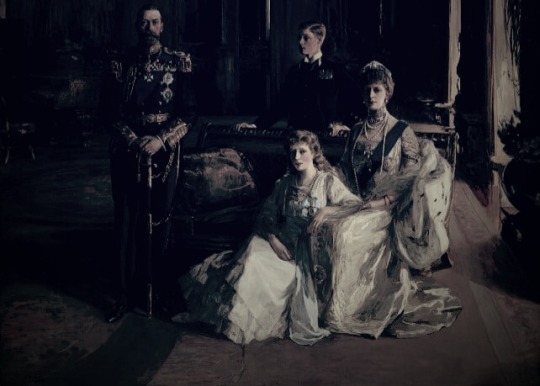
The Decision
Sorry about the wait. I know it's been a minute, but finally, part 2 of my taiju au royal fic
Part 1
@danni-k @festive @buttress
Its been two years
Two years of your new life
Two years of you holding no title
And
It had been two years since you last seen taiju.
To say you were caught off guard was an understatement, you and your maid had been having your afternoon tea when a knock came to your door. What once was a lovely afternoon with you and your closest friend soon turned to you sitting in silence , having tea with the king, and the tension so heavy you felt like you were being squeezed.
You noticed first of his changed appearance gone his longer hair to now a short slick back hair style, his clothing looked a big bigger you noticed he still was broad in stature but now more lean as well as some more muscles from what you remember.
“how have you been” you looked at him trying to read his face maybe seeing his true intentions, “it’s been two years…” you still remained quiet taking small sips out of your cup every now and then. Taiju gulped why weren’t you speaking? Did you take a vow a silence? Were you hoping this woild end quickly and he’d leave?? He immediately regretting his decision on coming here. “How’s the prince” you finally spoke, throwing off taiju he was lost in thought he didn’t catch what you had said “the who?” You furrowed your brows “the prince.. our son… the child I bore and you forbade from seeing his mother” he inhaled sharply trying his best not to lose his cool, he lowered his gaze from you pointing towards the liquid in his cup “he is fine… he does miss you” “I would too if I was told my mother is to be banished and no I longer to see or speak to her” taiju bit his tongue at your words “I didn’t come to argue with you” “then why did you come?” taiju mouth open but closed again, how does he go about asking for your help, that’s if you’d actually would help him. “We’ve gotten word that the Sano kingdom is planning an attack for more land. They have an armada with them and with little time we have none of my generals are ready” your eyes widen for years the Sano kingdom and shiba kingdom had seldomly been at odds with one another, your eyes shifted taiju could see the wheels turning in your mind. while yes you were once queen but you also had a voice when it came to situations such as this and each plan you’ve always commented on has brought taiju to where he is now, taiju rolled a map circling shows of the many countries displayed “this armada has what 10,000 men? And knowing that the Sano's are now bound together with king ryuguji due to marriage of princess Emma now queen, they have 15,000 men along the western coast as well” “they plan to cross the Channel in barges to reach further into our direction” “yes but taiju we have enough time if that’s the case” you looked over the map furrowed brows your mind was running
“your forces defend the inui kingdom that's what 4,000 men” “3,000 possibly” you started to rub your temple’s the odds weren't looking good “taiju if the sanos and ryuguji unite their combined strength will be overwhelming” taiju was starting to fidget , bouncing his leg thinking of every scenario on how this could end in his favor. Not being able to sit still he rose from his chair pacing back and forth. You looked through the map go through every possible way to throw off the enemy “why don’t you engage at sea” taiju stopped mid step “before the sanos and ryuguji unite attack the ryugujis at sea” taiju sighed “no, with the numbers they each have this vast armada will surely smash through our naval defenses and overrun us on land” taiju went silent for a bit “ive prepared for the worst” you looked at taiju with slight worry while the numbers game was not in your favor you hoped by some miracle you wouldn’t as well as many others be killed or ran out of the lands you called home.
You watched out the window, rain, thunder and lighting covered the sky. You’re maid was setting the table for the afternoon tea time, she could see your tense expression, today was the day of the war between the kingdoms while she herself wished luck on king shiba a part of her wonders if he were to die would that make you free from this place. Would you finally be happy and runaway with the prince and be off enjoying life. “Your majesty…” you turned noticing the table was set “tea is ready if you want to sit down for a bit” you nodded trying your best to stop your worrying you know it won’t do no good thinking of the worse.
A loud lighting cracked the sky making youn flinch, but with the crack you heard a loud knock at the door. You stayed still, it didn’t take long before your maid answered with letter in hand a messenger came inside to avoid being more drenched “your majesty an update on the war” you didn’t move without a second the man opened the letter “from lord kokonoi hajime, your majesty I have been instructed to write you this evening as you know our king and comrades have marched and with great joy I have been told the naval defenses of the combined kingdoms of sano and ryuguji have been greatly effected several ships have been destroyed and sunk seems the weather was on our side. I will write again with anymore updates please do not worry your majesty we know our king will fight to the end” you released a breathe you didn’t notice you were holding, while yes you were happy of the news it didn’t mean the war was over.
Several days had passed and you continued on with your daily routine like normal, you and your maid were ready to eat dinner when the front door was slammed open. Startling you both and with quick reaction your maid grabbed ahold a knife and stepping in front in case whatever came through the door was a threat. You glimpsed seeing the familiar hair color of the your ex-husband, his face was dirty, a cut on his right cheek and his armor with some dints. He locked eyes with you and within a second stomped his way not saying a word.
You’ve only been shocked several times in your life, you didn’t say a word as taiju wrapped his arms around you. Feeling the coldness of armor against you, you remained still. What were you to do? It’s been years since taiju showed this blatant public display of affection. “I am back my queen” you felt him squeeze a bit “you were all I could think about when I returned” while his words were sincere you felt a bit taken a back. What do you say? What could you say? You were lost in thought that you didn’t notice he had let you go. He could see the internal conflict you were having but for some reason he wasn’t upset about it.
You jumped a bit feeling his lips on you cheek, and within a ear shot of just you two he announced the words you will play over in your head “I will return to the kingdom, and in days time I will send someone for you” the look in eyes were serious a cruel joke you thought he was playing.
“I want you back… my love”
#tokyo revengers#taiju shiba#tokyo revengers taiju#tokyo revengers x reader#taiju x reader#taiju x y/n#tokrev taiju
32 notes
·
View notes
Text
The Israel-Palestine Conflict(i.e Israel committing genocide)
Alright, this post ties to my timeline post about Israel and Palestine's history. But I wanna give some facts and point out some thought experiments that I feel people pull out but then don't fully follow through. You can always refer to them because I've labeled things Facts, Points, Thought Experiments, and Opinions.
Will this probably piss some people off? Maybe, but I'm not staying quiet. These thought experiments matter
CW: Discussion about politics and genocide below
Here's the facts right now.
Fact 1 - Genocide and Ethnic Cleansing are two different things that can be closely related.
A - Ethnic Cleansing is defined as rendering an area ethnically the same by using force or intimidation to remove those of a different ethnic or religious group.
B - Genocide is any of the following acts committed with the intent to destroy, in whole or in part, a national, ethnic, racial, or religious group. This can be things such as the following; killing members of that group, causing serious bodily harm or mental harm to members of that group, deliberately inflicting on the group conditions of life meant to bring about its physical destruction in whole or in part, imposing measures to prevent births, and forcibly moving children from the group to another group.
This means that they are not the same thing, although Ethnic Cleansing can result in genocide.
Fact 2 - Israel has only existed for the last 75 years. Prior to that, it was in fact just Palestine, which consisted of Jordan, Israel, and Palestine. Attached is a link to this post I made which talks about the History of the two. Long and short, Israel is a Zionist colonized state that has forced the Arab population out and continues to commit genocide and apartheid.
Fact 3 - Every year since 2016, the U.S. has provided $3.8 billion dollars to the Israeli military. They have the Iron Dome, the radar-controlled launcher to intercept missiles. They have 339 aircraft and 169,500 personnel with 2,200+ tanks and 530 artillery. In 2022 Israel spent $23.4 billion on its military, actually putting it ahead of the U.S in regards to per capita military.
Fact 4 - Palestine has no air force, and no naval force, and their military forces tend to side with Israel. And even calling it a military force is a stretch as they have no land army. In fact, in Article XII of the Oslo II Accords, Palestine is only allowed a police force, and Israel is supposed to defend them. Thus Palestine has no way to defend itself from Israel.
Fact 5 - Israel has indeed poisoned water for Palestine in the past and is currently making the water undrinkable for those in Gaza. In 1948 Israel poisoned dozens of water wells in places that were about to be evacuated to stop Palestinians from going back there. Currently, Israel has imposed a blockade that is limiting people from getting clean water. The only aquifer in the Gaza area is contaminated by sewage and seawater.
Fact 6 - That by definition means Fact 5 is considered a violation of human rights. As of 2010, the UN General Assembly recognized that water is a human right. The countries that abstained included Israel and the United States. Both those states also objected to the proposal to make Palestine a non-member observer state(can't vote on resolutions). In fact, Palestine cannot submit itself to be appointed or elected to a position in the UN.
Fact 7 - Gaza has been under a strict blockade for the past 16 years. When it started, Israel cut down food supplies, and fuel imports and even during ceasefires refused things like medical aid to Gaza. In fact, when people tried to bring medical aid into Gaza by boat, the Israeli Navy boarded and used live ammunition with some of these aid members being shot from behind. In 2006, Israel bombed and destroyed the only power plant in Gaza as a result of a soldier being captured. As of 2023, that power plant still has not been repaired. In 2014, while there were claims that Hamas hid in a hospital, Israel still proceeded to bomb said hospital, cutting off aid. Israel controls everything that goes into Gaza including even food and building materials.
Fact 8 - Israel is targeting residential as well as medical areas in Gaza with missiles. This is in line with the attitude they have taken toward the Defense Minister saying that there will be no electricity, water, food, or fuel in Gaza anymore. And saying "We are fighting human animals and we act accordingly." Netanyahu used similar language about Hamas saying that they are "an abominable enemy, human beasts who celebrate the murder of women, children and the elderly.” Most of Gaza is refugees and children.
Fact 9 - Palestinian casualties have always been massive whenever there has been a conflict compared to Israel. From January 1st, 2008 to August 31st, 2023 the total number of Palestinian casualties was over 6,000. Israel was 308 and of that 308, 177 were civilians and 131 were Israeli Forces. I do not separate the Palestinian casualties as there are no military forces. Data from United Nations Office for the Coordination of Humanitarian Affairs
Fact 10 - Apartheid is defined as enforced racial segregation, and the domination and oppression of one racial group by another. By this definition, what Israel is doing is in fact Apartheid against the Palestinian people.
Fact 11 - Israel is claiming that Hamas is beheading bodies however this claim has been proven to be propaganda and debunked and shown as coming from an extremist Israeli soldier, and this is not the only propaganda that they are pushing. This is similar to how the US claimed Iraq had WMDs to justify invading Iraq.
Point - Dehumanizing the people to animals which is common rhetoric when committing genocide. In fact, by the 10 Stages of Genocide Israel has reached roughly stage 4.
Point - With Israel being such a huge ally of the U.S. it is not surprising that they would start using the same playbook.
Thought Experiment - If you were to flip this, with Israel having the limited resources that Palestine has, and Palestine having the backing, land, and resources of Israel and it was Muslims doing to Jewish people would you be siding with Palestine? Just a thought to think about.
Point - Being anti-Zionist does not mean being antisemitic. Zionism is based on a colonial belief. Zionism counted on the idea of an imperial power thinking that a Jewish colonial outpost in the Middle East was worth backing. The founders even said how they would remove the indigenous people by force.
Opinion - The Two-State solution is impossible because based on the above points and facts it would still imply the acceptance of the Arab population having been displaced by their native land.
Thought Experiment - If you claim that by supporting Palestine or Hamas you are supporting violence, ask yourself this. What should the Palestinians do? They are being attacked even during ceasefires have lost basic human rights and are slowly being killed. Should they just continue to sit there and hope that peaceful protests will stop the bombs being dropped?
Opinion/Thought Experiment - Think of either the Holocaust or the American Slave Trade. Both did not end through peaceful means and in this case, the Palestinians are the oppressed. Is it unreasonable that groups would fight back against their oppressors?
Thought Experiment - If you are fine with Ukrainians using military force to stop Russia, why do you not feel the same about Palestinians doing the same against their military aggressor?
#fuck israel#pro palestinian#thought experiment#israel is a terrorist state#palestine is a country#israel is committing genocide#palestine
8 notes
·
View notes
Text
Rubs my evil little hands together >:)
I know I basically answered a bunch of these questions here in my intro post for this au but it never hurts to ramble a little more LMAO
• i. what is your character's background and current status in the hierarchy? (don't be afraid to info dump <3)
Queen Maria Castello used to be a beloved queen, but paranoia and grief have turned her into a tyrant. The kingdoms she used to trade with have tried sending ships out to check on her after letters failed, only to find the water near Soledosa too dangerous to traverse.
Xenos Morrow used to be the queens closest friend and advisor- but also the princesses biggest advocate behind closed doors. He wasn't very vocal or obvious about his support for the princess, in fear of causing the prophecy he foretold to come to pass too early. When it was obvious nothing more could be done to prevent things from getting worse, he was the one who fled with the princess and used his gift to map out the safest path by boat to the mainland. In his exile now, he uses his gift of foresight to ensure the princess is well on her way to becoming her peoples savior, using the weapon he gave her the kingdom needs saving, even if questionable measures are taken...
Princess Viz Castello has always hated her title, but it gives her the power she needs when she throws it around. To the general public, she is known as the Scarlet Crusader, a rogue knight who, generally, has a strong moral code. After four years of constant training, she finally feels she has the courage and ...enough knowledge to ride to other kingdoms, announce her status, and ask for help.
• ii. what kingdom does your character reside in? and what's their opinion about it?
My three characters are all from the Kingdom of Soledosa, though (depending on the worldbuilding) Xenos would have been born in a different Kingdom.
Maria is disillusioned about its current state, believing whole heartedly that her domineering rule has only made the kingdom more vibrant - in reality, it's more like a post-apocalyptic wasteland, except for her castle.
Xenos wishes for the kingdom to be restored. He never saw the aftermath of the mass killing Maria instigated, and part of him hopes he never has to.
Viz never saw more of the kingdom than what was just outside of castle walls. She never knew the paradise that Soledosa once was, but she hopes that for her people, she can bring about some sort of restoration.
• iii. do they have any goals in mind?
To put it concisely ig:
Maria wants to maintain an iron grip on her kingdom. Her daughter is dead to her now.
Xenos wants the kingdom to be free, through any means necessary, (but cannot act on more than he has out of a sense of obligation to the people and the princess)
Viz wants to end her mother's reign and begin reparations with her people and other kingdoms to restore Soledosa.
• iv. what is your character's reputation within the society?
Maria is viewed negatively all around. Her people want to revolt, but cannot. The kingdoms she used to trade with were concerned until she finally sent one last letter, not explaining anything, just that she no longer wanted to trade, and any further contact would result in a declaration of war. It was extreme, and untrue, seeing as she had sunk her navy, but nobody would know that, and her naval force had been one to be feared. While not labeled explicitly as a tyrant outside of her kingdom, she is seen as unreasonable and has been blacklisted for trade for many countries.
Xenos is only known by a select few outside of the kingdom, other nobles and their seers/advisors if they have them. He is generally off-putting at first, but comes off as very charming (and sly). He is not easily trusted.
Outside of the kingdom, nobody knew there was an heir to the throne. She knew her mothers reputation would shackle her like a ball and chain; which is exactly why she built a positive reputation for herself as the Scarlet Crusader. She makes her motives known on every mission she goes on, announcing she aims to free the Kingdom of Soledosa, parading as a common person who managed to escape. She does not reveal her identity readily as the princess; only to those who Soledosa used to trade with. While she has no proof to her claims, she is the spitting image of her father. While mysterious and a little odd, her reputation as a noble and fearless knight precedes her.
• v. does your character have a good relationship with the common people?
Maria and Viz, I feel I have answered indirectly several times XD
But Xenos has a very mixed relationship with the common folk of Soledosa. Some say it was him and his abilities that manifested this fate on Soledosa. Some think he intended to take over Soledosa himself. Some people find him unsettling, but take solace in the fact he can prepare them for any foreseeable future. Some see him as a savior, for delivering their princess to safety; though the small population that knows that he took part in that cannot spread the word easily.
• vi. does your character have any allies? what do they gain from this partnership?
(This depends on worldbuilding :D)
• vii. what is your character's relationship with their family, friends, and perhaps servants?
Viz is suspicious of Xenos, but feels guilty for suspecting him. She generally has good intuition though...
Xenos and Viz are dead to Maria. Though if Viz were to return, Maria would be forced to question herself, whether everything she has done was truly for the well being of her daughter
• viii. who does your character fancy? is it a secret admiration? does this affection conflict with their goals?
SO THIS REALLY DEPENDS LMFAO
If I am allowed to worldbuild the Diamonds, then I will expand on it. If not, then I guess we'll see!!!
• ix. what is the most shocking rumor about your character? is it true or simply a story that's been made up?
Maria
- some say she's been possessed and needs a priest. (I will not confirm nor deny)
Xenos
- a god in disguise (False, but true when it's funny)
- a fraud (??)
- he had been planning a coup for a while (false)
Viz
- a fraud
- the princess of a lost kingdom (bitch how do you loose a kingdom its a whole ass island???)
• x. does your character have a secret?
I feel like Xenos does but I cannot!! Articulate it right now. Obviously Viz does with her identity.
•How does other nobles view your character? what are they doing about it?
Kinda answered this already!!
Idk what they're doing about it, hopefully agreeing to an alliance, or at least to open the idea of trade once she frees the kingdom. (That being said, I'm totally okay with Viz getting DUMMIED on a mission and needing medical assistance from someone if anyone wants that kind of interaction)
•Can you give us Fun facts about your character?
Maria has a compulsive need for order and patterns, though not diagnosed, it's likely she has OCD.
Xenos hates animals, especially small ones
Viz is a flirt but she's aro/demiromantic so it backfires sometimes LMAO
Please Notice Me Prince!!♡ AU {Note: Worldbuilding is still in progress, so I suggest skipping related questions on that until I post it!!}
📌👑 Question's for you!!
"Welcome esteemed guests. It is my utmost pleasure to present you to a series of inquiries that will hopefully guide you to your desires, ambition and secrets within this grand and intricate society. I sincerely hope you enjoy your stay and I wish you great fortune for this treacherous journey..."
• i. what is your character's background and current status in the hierarchy? (don't be afraid to info dump <3)
• ii. what kingdom does your character reside in? and what's their opinion about it?
• iii. do they have any goals in mind?
• iv. what is your character's reputation within the society?
• v. does your character have a good relationship with the common people?
• vi. does your character have any allies? what do they gain from this partnership?
• vii. what is your character's relationship with their family, friends, and perhaps servants?
• viii. who does your character fancy? is it a secret admiration? does this affection conflict with their goals?
• ix. what is the most shocking rumor about your character? is it true or simply a story that's been made up?
• x. does your character have a secret?
Extra questions: (optional)
•How does other nobles view your character? what are they doing about it?
•Can you give us Fun facts about your character?
#please notice me prince!!♡#q&a#v talks#oc: vizzie castello#vizzie castello#xenos morrow#oc: xenos morrow
32 notes
·
View notes
Text
Anonymous asked: I have always appreciated your thoughtful views on the defence of the British monarchy, and as a university historian it’s reassuring to see someone using history to make invalubale insights to a controversial institution. I wonder what are your own thoughts on the passing of Prince Philip and what his legacy might be? Was he a gaffe prone racist and a liability to the Queen?
I know you kindly got in touch and identified yourself when you felt I was ignoring your question. I’m glad we cleared that up via DM. The truth is as I said and I’m saying here is that I had to let some time pass before I felt I could reasonably answer this question. Simply because - as you know as someone who teaches history at university - distance is good to make a sober appraisal rather than knee jerk in the moment judgements.
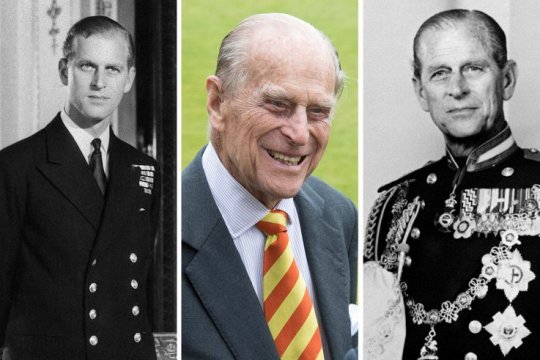
Contrary to what some might think I’m not really a fan girl when it comes to the royal family. I don’t religiously follow their every movement or utterance especially as I live in Paris and therefore I don’t really care about tabloid tittle tattle. I only get to hear of anything to do with the royal family when I speak to my parents or my great aunts and uncles for whom the subject is closer to their heart because of the services my family has rendered over past generations to the monarchy and the older (and dying) tight knit social circles they travel in.
Like Walter Bagehot, I’m more interested in the monarchy as an institution and its constitutional place within the historical, social, and political fabric of Britain and its continued delicate stabilising importance to that effect. It was Walter Bagehot, the great constitutional scholar and editor the Economist magazine, who said, “The mystic reverence, the religious allegiance, which are essential to a true monarchy, are imaginative sentiments that no legislature can manufacture in any people.” In his view, a politically-inactive monarchy served the best interests of the United Kingdom; by abstaining from direct rule, the monarch levitated above the political fray with dignity, and remained a respected personage to whom all subjects could look to as a guiding light.
Even as a staunch monarchist I freely confess that there has always been this odd nature of the relationship between hereditary monarchy and a society increasingly ambivalent about the institution. To paraphrase Bagehot again, there has been too much ‘daylight’ shone onto the ‘magic’ of the monarchy because we are obsessed with personalities as celebrities.
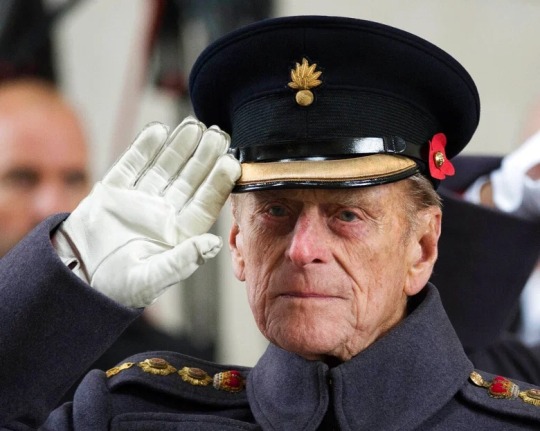
Having said that I did feel saddened by the passing of Prince Philip, the Duke of Edinburgh. After the Queen, he was my favourite royal. Anne, Princess Royal, would come next because she is very much like her father in temperament, humour, and character, so unlike her other brothers.
I have met the late Prince Philip when I was serving in the army in a few regimental meet-and-greet situations - which as you may know is pretty normal given that members of the royal family serve as honorary colonel-in-chiefs (patrons in effect) of all the British army regiments and corps.I also saw him at one or two social events such the annual charitable Royal Caledonian Ball (he’s an expert scottish reeler) and the Guards Polo Club where my older brothers played.
I’ll will freely confess that he was the one royal I could come close to identify with because his personal biography resonated with me a great deal.
Let’s be honest, the core Windsor family members, born to privilege, are conditioned and raised to be dull. Perhaps that’s a a tad harsh. I would prefer the term ‘anonymously self-effacing’, just another way of saying ‘for God’s sake don’t draw attention to yourself by saying or doing anything even mildly scandalous or political lest it invites public opprobrium and scrutiny’. The Queen magnificently succeeds in this but the others from Charles down just haven’t (with the exception of Princess Anne).
However, many people forget this obvious fact that it’s the incoming husbands and wives who marry into the Windsor family who are relied upon to bring colour and even liven things up a little. And long before Kate Middleton, Meghan Markle (very briefly), or Lady Diana Spencer, were the stars of ‘The Firm’- a phrase first coined by King George VI, Queen Elizabeth II's father who ruled from 1936 to 1952, who was thought to have wryly said, "British royals are 'not a family, we're a firm,” - it was Prince Philip who really livened things up and made the greater impact on the monarchy than any of them in the long term.
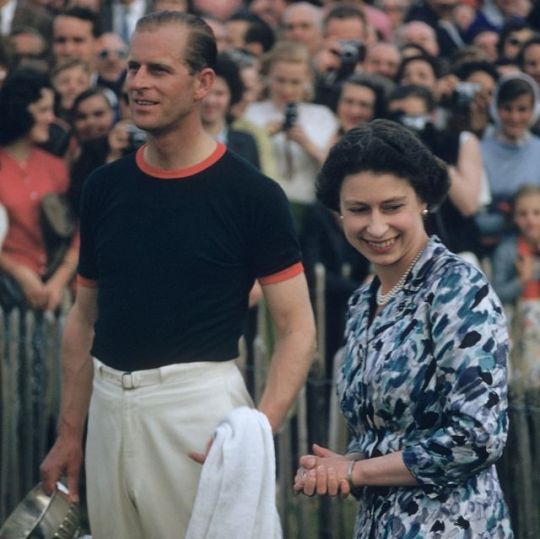
Prince Philip’s passing belied the truth of a far more complex individual: a destitute and penniless refugee Greek-Danish prince with a heart breaking backstory that could have been penned by any 19th Century novelist, and also eagle eyed reformer who tried to drag the royal family into the 20th century. At the core of the man - lost scion of a lost European royal dynasty, a courageous war veteran, and Queen’s consort - were values in which he attempted to transform and yet maintain much older inherited traditions and attitudes. Due to his great longevity, Philip’s life came to span a period of social change that is almost unprecedented, and almost no one in history viewed such a transformation from the front row.
Prince Philip would seem to represent in an acute form the best of the values of that era, which in many ways jar with today’s. He had fought with great courage in the war as a dashing young naval officer; he was regularly rude to foreigners, which was obviously a bonus to all Brits. He liked to ride and sail and shoot things. He was unsentimental almost to a comic degree, which felt reassuring at a time when a new-found emotional incontinence made many feel uncomfortable. Outrageous to some but endearing to others, he was the sort of man you’d want to go for a pint with, perhaps the ultimate compliment that an Englishman can pay to another Englishman. This has its own delicious irony as he wasn’t really an Englishman.
There are 4 takeways I would suggest in my appraisal of Prince Philip that stand out for me. So let me go through each one.
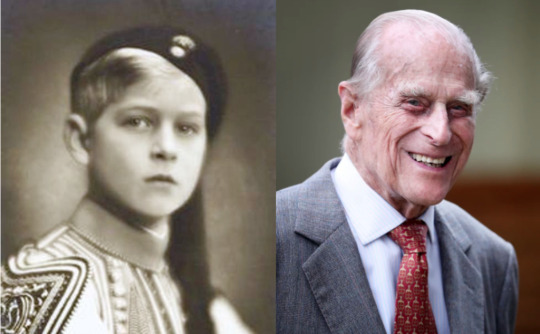
1. Prince Philip’s Internationalism
It may seem odd for me to say that Prince Philip wasn’t English but he wasn’t an Englishman in any real sense. He was a wretch of the world - stateless, homeless, and penniless. That the Prince of Nowhere became the British Monarchy’s figurehead was more than fitting for a great age of migration and transition in which the Royal Family survived and even flourished. That he was able to transform himself into the quintessential Englishman is testimony not just to his personal determination but also to the powerful cultural pull of Britishness.
He was born on a kitchen table in Corfu in June 1921. A year later in 1922, Philip, as the the great-great-grandson of Queen Victoria and nephew of Constantine I of Greece, was forced to flee with his family after the abdication of Constantine. He grew up outside Paris speaking French; ethnically he was mostly German although he considered himself Danish, his family originating from the Schleswig border region. He was in effect, despite his demeanour of Royal Navy officer briskness, a citizen of nowhere in an age of movement. From a very young age he was a stateless person, nationally homeless. Indeed, Philip was an outsider in a way that even Meghan Markle could never be; at his wedding in 1947, his three surviving sisters and two brothers-in-law were not permitted to attend because they were literally Britain’s enemies, having fought for the Germans. A third brother-in-law had even been in the SS, working directly for Himmler, but had been killed in the conflict.
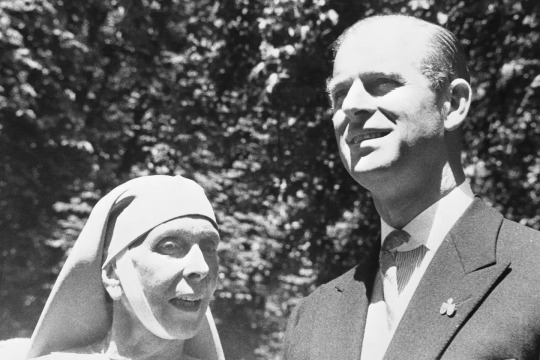
Even his religion was slightly exotic. He was Greek Orthodox until he converted to Anglicanism on marrying Elizabeth - what with his wife due to become supreme head of the Church and everything - but his ties with eastern Christianity remained. His great-aunts Princess Elisabeth of Hesse and by Rhine and Tsarina Alexandra are both martyrs of the Russian Orthodox Church, having been murdered by the Bolsheviks; Philip’s mother went on to become an Orthodox nun and a “Righteous Among the Nations” for saving a Jewish family during the Nazi occupation of Greece, spending much of her time in squalid poverty.
His parents were part of the largely German extended aristocracy who ruled almost all of Europe before it all came crashing down in 1918. When he died, aged 99, it marked a near-century in which all the great ideological struggles had been and gone; he had been born before the Soviet Union but outlived the Cold War, the War on Terror and - almost - Covid-19.
The world that Philip was born into was a far more violent and dangerous place than ours. In the year he was born, Irish rebels were still fighting Black and Tans; over the course of 12 months the Spanish and Japanese prime ministers were assassinated, there was a coup in Portugal and race riots in the United States. Germany was rocked by violence from the far-Left and far-Right, while in Italy a brutal new political movement, the Fascists, secured 30 seats in parliament, led by a trashy journalist called Benito Mussolini.
The worst violence, however, took place in Greece and Turkey. Following the defeat of the Ottoman Empire, what remained of Turkey was marked for permanent enfeeblement by the Allies. But much to everyone’s surprise the country’s force were roused by the brilliant officer Mustafa Kemal, who led the Turks to victory. Constantinople was lost to Christendom for good and thousands of years of Hellenic culture was put to the flames in Smyrna.
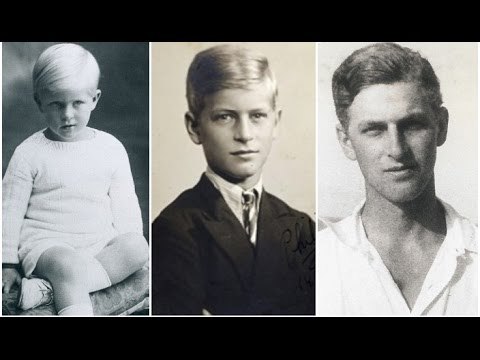
The Greek royal family, north German imports shipped in during the 19th century, bore much of the popular anger for this disaster. King Constantine fled to Italy, and his brother Andrew was arrested and only escaped execution through the intervention of his relative Britain’s George V. Andrew’s wife Alice, their four daughters and infant son Philip fled to France, completely impoverished but with the one possession that ensures that aristocrats are never truly poor: connections.
Philip had a traumatic childhood. He was forged by the turmoil of his first decade and then moulded by his schooling. His early years were spent wandering, as his place of birth ejected him, his family disintegrated and he moved from country to country, none of them ever his own. When he was just a year old, he and his family were scooped up by a British destroyer from his home on the Greek island of Corfu after his father had been condemned to death. They were deposited in Italy. One of Philip's first international journeys was spent crawling around on the floor of the train from an Italian port city, "the grubby child on the desolate train pulling out of the Brindisi night," as his older sister Sophia later described it.
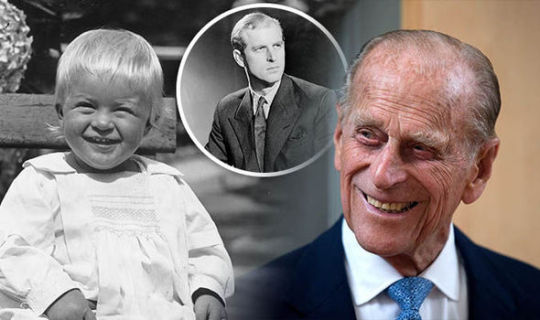
In Paris, he lived in a house borrowed from a relative; but it was not destined to become a home. In just one year, while he was at boarding school in Britain, the mental health of his mother, Princess Alice, deteriorated and she went into an asylum; his father, Prince Andrew, went off to Monte Carlo to live with his mistress. "I don't think anybody thinks I had a father," he once said. Andrew would die during the war. Philip went to Monte Carlo to pick up his father's possessions after the Germans had been driven from France; there was almost nothing left, just a couple of clothes brushes and some cuff-links.
Philip’s four sisters were all much older, and were soon all married to German aristocrats (the youngest would soon die in an aeroplane crash, along with her husband and children). His sisters became ever more embroiled in the German regime. In Scotland going to Gordonstoun boarding school, Philip went the opposite direction, becoming ever more British. Following the death of his sister Cecilie in a plane crash in 1937, the gulf widened. As the clouds of conflict gathered, the family simply disintegrated. With a flash of the flinty stoicism that many would later interpret, with no little justification, as self-reliance to the point of dispassion, the prince explained: “It’s simply what happened. The family broke up… I just had to get on with it. You do. One does.”
In the space of 10 years he had gone from a prince of Greece to a wandering, homeless, and virtually penniless boy with no-one to care for him. He got through it by making a joke of everything, and by being practical.
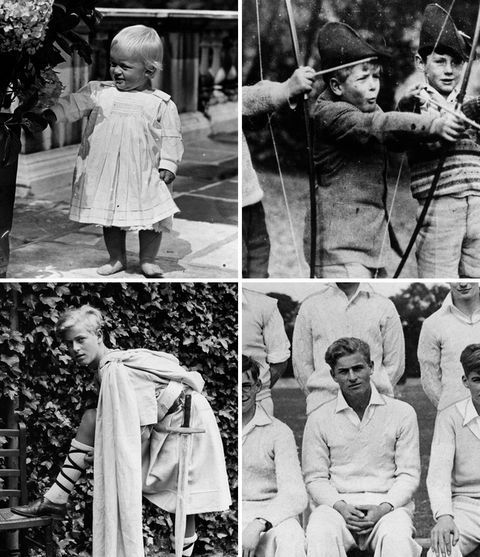
By the time he went to Gordonstoun, a private boarding school on the north coast of Scotland, Philip was tough, independent and able to fend for himself; he'd had to be. Gordonstoun would channel those traits into the school's distinct philosophy of community service, teamwork, responsibility and respect for the individual. And it sparked one of the great passions of Philip's life - his love of the sea. It was Gordonstoun that nurtured that love through the maturation of his character.
Philip adored the school as much as his son Charles would despise it. Not just because the stress it put on physical as well as mental excellence - he was a great sportsman. But because of its ethos, laid down by its founder Kurt Hahn, a Jewish exile from Nazi Germany.
Hahn first met Philip as a boy in Nazi Germany. Through a connection via one of his sister’s husbands, Philip, the poor, lonely boy was first sent off to a new school - in Nazi Germany. Which was as fun as can be imagined. Schloss Salem had been co-founded by stern educator called Kurt Hahn, a tough, discipline-obsessed conservative nationalist who saw civilisation in inexorable decline. But by this stage Hahn, persecuted for being Jewish in Nazi Germany, had fled to Britain, and Philip did not spend long at the school either, where pressure from the authorities was already making things difficult for the teachers. Philip laughed at the Nazis at first, because their salute was the same gesture the boys at his previous school had to make when they wanted to go to the toilet, but within a year he was back in England, a refugee once again.
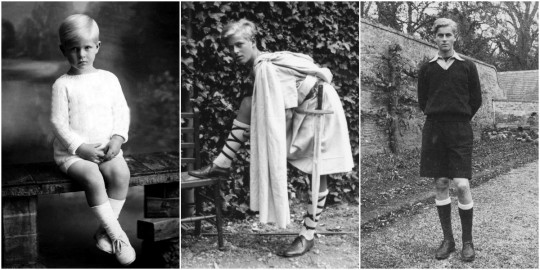
Philip happily attended Hahn’s new school, Gordonstoun, which the strict disciplinarian had set up in the Scottish Highlands. Inspired by Ancient Sparta, the boys (and then later girls) had to run around barefoot and endure cold showers, even in winter, the whole aim of which was to drive away the inevitable civilisational decay Hahn saw all around him. To 21st century ears it sounds like hell on earth, yet Philip enjoyed it, illustrating just what a totally alien world he came from.
That ethos became a significant, perhaps the significant, part of the way that Philip believed life should be lived. It shines through the speeches he gave later in his life. "The essence of freedom," he would say in Ghana in 1958, "is discipline and self-control." The comforts of the post-war era, he told the British Schools Exploring Society a year earlier, may be important "but it is much more important that the human spirit should not be stifled by easy living". And two years before that, he spoke to the boys of Ipswich School of the moral as well as material imperatives of life, with the "importance of the individual" as the "guiding principle of our society".
It was at Gordonstoun one of the great contradictions of Philip's fascinating life was born. The importance of the individual was what in Kurt Hahn's eyes differentiated Britain and liberal democracies from the kind of totalitarian dictatorship that he had fled. Philip put that centrality of the individual, and individual agency - the ability we have as humans to make our own moral and ethical decisions - at the heart of his philosophy.
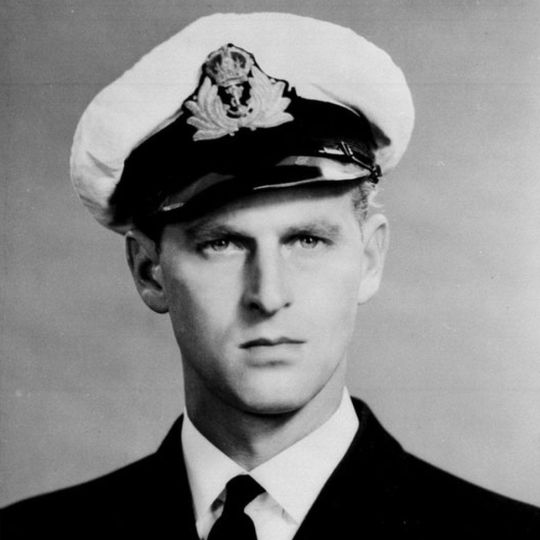
At Dartmouth Naval College in 1939, the two great passions of his life would collide. He had learned to sail at Gordonstoun; he would learn to lead at Dartmouth. And his driving desire to achieve, and to win, would shine through. Despite entering the college far later than most other cadets, he would graduate top of his class in 1940. In further training at Portsmouth, he gained the top grade in four out of five sections of the exam. He became one of the youngest first lieutenants in the Royal Navy.
The navy ran deep in his family. His maternal grandfather had been the First Sea Lord, the commander of the Royal Navy; his uncle, "Dickie" Mountbatten, had command of a destroyer while Philip was in training. In war, he showed not only bravery but guile. It was his natural milieu. "Prince Philip", wrote Gordonstoun headmaster Kurt Hahn admiringly, "will make his mark in any profession where he will have to prove himself in a trial of strength".
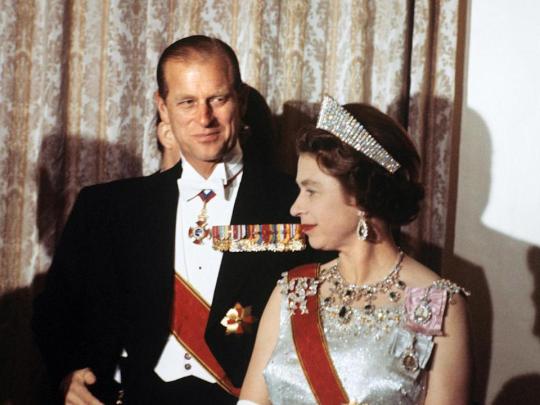
2. Prince Philip and the modernisation of the monarchy
In his own words, the process of defining what it meant to be a royal consort was one of “trial and error.” Speaking with BBC One’s Fiona Bruce in 2011, Philip explained, “There was no precedent. If I asked somebody, 'What do you expect me to do?' they all looked blank. They had no bloody idea, nobody had much idea.” So he forged for himself a role as a moderniser of the monarchy.
He could not have had much idea back in 1939. Back then in Dartmouth in 1939, as war became ever more certain, the navy was his destiny. He had fallen in love with the sea itself. "It is an extraordinary master or mistress," he would say later, "it has such extraordinary moods." But a rival to the sea would come.
When King George VI toured Dartmouth Naval College, accompanied by Philip's uncle, he brought with him his daughter, Princess Elizabeth. Philip was asked to look after her. He showed off to her, vaulting the nets of the tennis court in the grounds of the college. He was confident, outgoing, strikingly handsome, of royal blood if without a throne. She was beautiful, a little sheltered, a little serious, and very smitten by Philip.
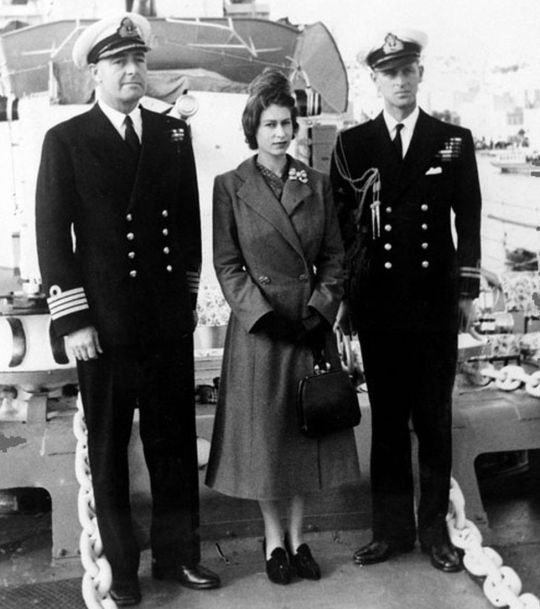
Did he know then that this was a collision of two great passions? That he could not have the sea and the beautiful young woman? For a time after their wedding in 1948, he did have both. As young newlyweds in Malta, he had what he so prized - command of a ship - and they had two idyllic years together. But the illness and then early death of King George VI brought it all to an end.
He knew what it meant, the moment he was told. Up in a lodge in Kenya, touring Africa, with Princess Elizabeth in place of the King, Philip was told first of the monarch's death in February 1952. He looked, said his equerry Mike Parker, "as if a ton of bricks had fallen on him". For some time he sat, slumped in a chair, a newspaper covering his head and chest. His princess had become the Queen. His world had changed irrevocably.
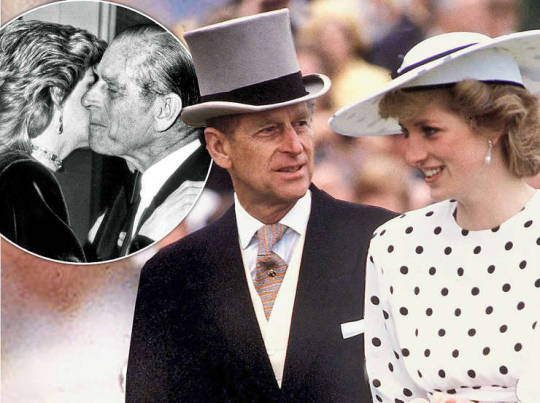
While the late Princess Diana was later to famously claim that there were “three people” in her marriage - herself, Prince Charles and Camilla - there were at least 55 million in Philip and Elizabeth’s. As Elizabeth dedicated her life to her people at Westminster Abbey at the Coronation on June 2, 1953, it sparked something of an existential crisis in Philip. Many people even after his death have never really understood this pivotal moment in Philip’s life. All his dreams of being a naval officer and a life at sea as well as being the primary provider and partner in his marriage were now sacrificed on the altar of duty and love.
With his career was now over, and he was now destined to become the spare part. Philip, very reasonably, asked that his future children and indeed his family be known by his name, Mountbatten. In effect he was asking to change the royal family’s name from the House of Windsor to the House of Mountbatten. But when Prime Minister Winston Churchill got wind of it as well as the more politically agile courtiers behind the Queen, a prolonged battle of wits ensued, and it was one Philip ultimately lost. It was only in 1957 that he accepted the title of “Prince.”
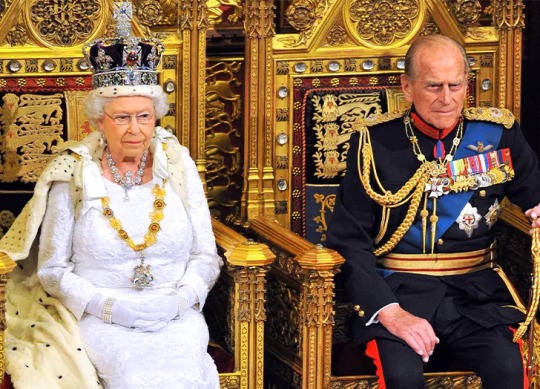
Even though he had almost lost everything dear to him and his role now undefined, he didn’t throw himself a pity party. He just got on with it. Philip tried to forge his own distinct role as second fiddle to the woman who had come to represent Great Britain. He designated himself the First Officer of the Good Ship Windsor. He set about dusting off some of the cobwebs off the throne and letting some daylight unto the workings of the monarchy by advocating reasonable amount of modernisation of the monarchy.
He had ideas about modernising the royal family that might be called “improving optics” today. But in his heart of hearts he didn’t want the monarchy to become a stuffy museum piece. He envisaged a less stuffy and more popular monarchy, relevant to the lives of ordinary people. Progress was always going to be incremental as he had sturdy opposition from the old guard who wanted to keep everything as it was, but nevertheless his stubborn energy resulted in significant changes.
When a commission chaired by Prince Philip proposed broadcasting the 1953 investiture ceremony that formally named Elizabeth II as queen on live television, Prime Minister Winston Churchill reacted with outright horror, declaring, “It would be unfitting that the whole ceremony should be presented as if it were a theatrical performance.” Though the queen had initially voiced similar concerns, she eventually came around to the idea, allowing the broadcast of all but one segment of the coronation. Ultimately, according to the BBC, more than 20 million people tuned in to the televised ceremony - a credit to the foresight of Philip.
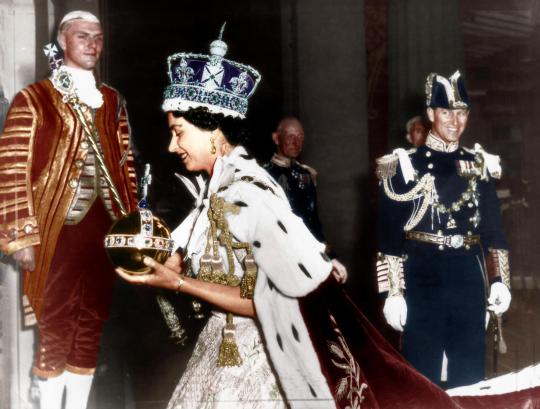
Elizabeth’s coronation marked a watershed moment for a monarchy that has, historically, been very hands off, old-fashioned and slightly invisible. Over the following years, the royals continued to embrace television as a way of connecting with the British people: In 1957, the queen delivered her annual Christmas address during a live broadcast. Again, this was Philip’s doing when he cajoled the Queen to televise her message live. He even helped her in how to use the teleprompter to get over her nerves and be herself on screen.
Four years later, in 1961, Philip became the first family member to sit for a television interview. It is hard for us to imagine now but back then it was huge. For many it was a significant step in modernising the monarchy.
Though not everything went to plan. Toward the end of the decade, the Windsors even invited cameras into their home. A 1969 BBC fly-on-the-wall documentary, instigated by Philip to show life behind the scenes, turned into an unmitigated disaster: “The Windsors” revealed the royals to be a fairly normal, if very rich, British upper-class family who liked barbecues, ice cream, watching television and bickering. The mystery of royalty took a hit below the waterline from their own torpedo, a self-inflicted wound from which they took a long time to recover. Shown once, the documentary was never aired again. But it had an irreversible effect, and not just by revealing the royals to be ordinary. By allowing the cameras in, Philip opened the lid to the prying eyes of the paparazzi who could legitimately argue that since the Royals themselves had sanctioned exposure, anything went. From then on, minor members of the House of Windsor were picked off by the press, like helpless tethered animals on a hunting safari.
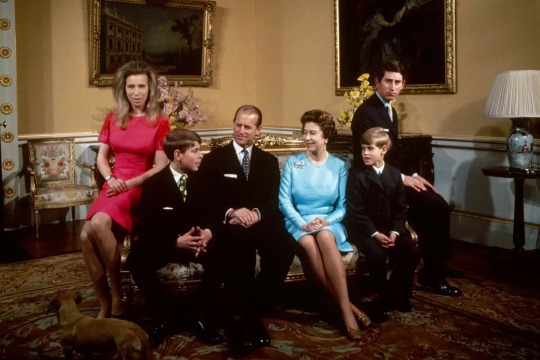
Prince Philip also took steps to reorganise and renovate the royal estates in Sandringham and Balmoral such as intercoms, modern dish washers, generally sought to make the royal household and the monarchy less stuffy, not to have so much formality everywhere.
Philip helped modernised the monarchy in other ways to acknowledge that the monarchy could be responsive to changes in society. It was Prince Philip - much to the chagrin of the haughty Princess Margaret and other stuffy old courtiers - who persuaded the Queen to host informal lunches and garden parties designed to engage a broader swath of the British public. Conversely, Prince Philip heartily encouraged the Queen (she was all for it apparently but was still finding her feet as a new monarch) to end the traditional practice of presenting debutantes from aristocratic backgrounds at court in 1952. For Philip and others it felt antiquated and out of touch with society. I know in speaking to my grandmother and others in her generation the decision was received with disbelief at how this foreign penniless upstart could come and stomp on the dreams of mothers left to clutch their pearls at the prospect there would be no shop window for their daughter to attract a suitable gentleman for marriage. One of my great aunts was over the moon happy that she never would have to go through what she saw as a very silly ceremony because she preferred her muddy wellies to high heels.
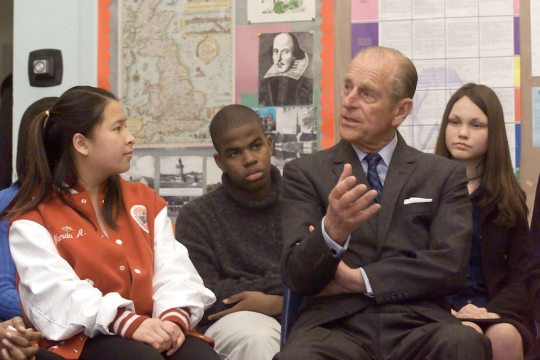
A former senior member of the royal household, who spent several years working as one of Prince Philip’s aides, and an old family friend, once told us around a family dinner table that the Duke of Edinburgh was undoubtedly given a sense of permanence by his marriage into the Royal Family that was missing from earlier years. But the royal aide would hastily add that Prince Philip, of course, would never see it that way.
Prince Philip’s attitude was to never brood on things or seek excuses. And he did indeed get on with the job in his own way - there should be no doubt that when it came to building and strengthening the Royal Family it was a partnership of equals with the Queen. Indeed contrary to Netflix’s hugely popular series ‘The Crown’ and its depiction of the royal marriage with Philip’s resentment at playing second fiddle, the prince recognised that his “first duty was to serve the Queen in the best way I could,” as he told ITV in 2011. Though this role was somewhat ill-suited to his dynamic, driven, and outspoken temperament, Philip performed it with utter devotion.
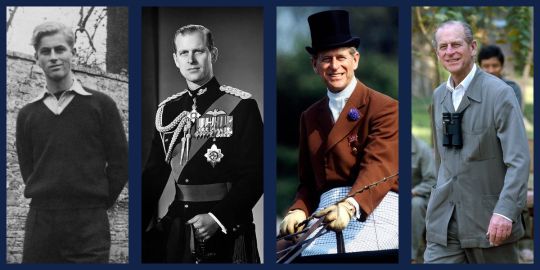
3. Prince Philip’s legacy
One could argue rightly that modernising the monarchy was his lasting legacy achievement. But he also tried to modernise a spent and exhausted Britain as it emerged from a ruinous war. When peace came, and with it eventual economic recovery, Philip would throw himself into the construction of a better Britain, urging the country to adopt scientific methods, embracing the ideas of industrial design, planning, education and training. A decade before Harold Wilson talked of the "white heat of the technological revolution", Philip was urging modernity on the nation in speeches and interviews. He was on top of his reading of the latest scientific breakthroughs and well read in break out innovations.
This interest in modernisation was only matched by his love for nature. As the country and the world became richer and consumed ever more, Philip warned of the impact on the environment, well before it was even vaguely fashionable. As president of the World Wildlife Fund (WWF) in the UK for more than 20 years from 1961, he was one of the first high-profile advocates of the cause of conservation and biological diversity at a time when it was considered the preserve of an eccentric few.
For a generation of school children in Britain and the Commonwealth though, his most lasting legacy and achievement will be the Duke of Edinburgh Awards (DofE). He set up the Duke of Edinburgh award, a scheme aimed at getting young people out into nature in search of adventure or be of service to their communities. It was a scheme that could match the legacy of Baden Powell’s scouts movement.
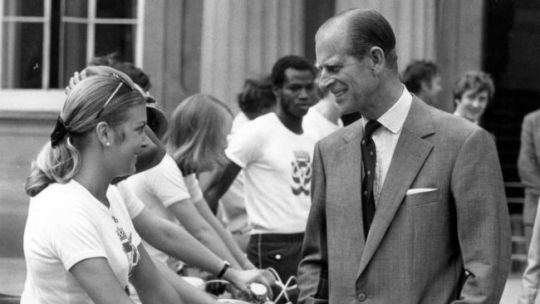
When Prince Philip first outlined his idea of a scheme to harness the values of his education at Gordonstoun by bringing character-building outdoor pursuits to the many rather than the fee-paying few, he received short shrift from the government of the day. The then minister of education, Sir David Eccles responded to the Duke’s proposal by saying: “I hear you’re trying to invent something like the Hitler Youth.” Undeterred he pushed on until it came to fruition.
I’m so glad that he did. I remember how proud I was for getting my DofE Awards while I was at boarding school. With the support of great mentors I managed to achieve my goals: collecting second-hand English books for a literacy programme for orphaned street children in Delhi, India with a close Indian school friend and her family; and completing a 350 mile hike following St. Olav’s Pilgrimmage Trail from Selånger, on the east coast of Sweden, and ending at Nidaros Cathedral in Trondheim, on the west coast of Norway.
It continues to be an enduring legacy. Since its launch in 1956, the Duke of Edinburgh awards have been bestowed upon some 2.5 million youngsters in Britain and some eight million worldwide. For a man who once referred to himself as a “Greek princeling of no consequence”, his pioneering tutelage of these two organisations (alongside some 778 other organisations of which he was either president or a patron) would be sufficient legacy for most.
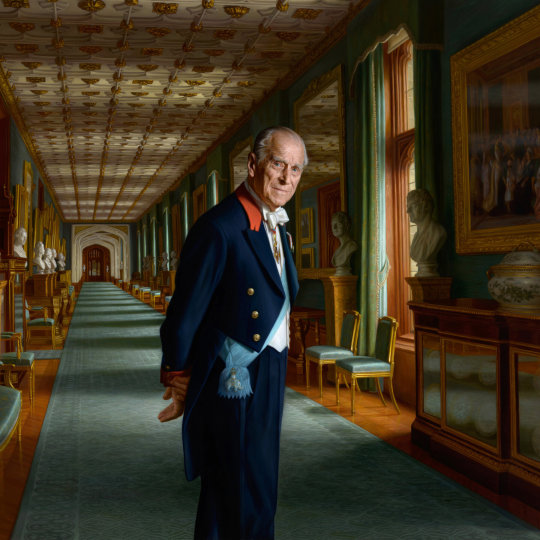
4. Prince Philip’s character
It may surprise some but what I liked most about Prince Philip was the very thing that helped him achieve so much and leave a lasting legacy: his character.
It is unhelpful to the caricature of Prince Philip as an unwavering but pugnacious consort whose chief talent was a dizzying facility in off-colour one-liners that he was widely read and probably the cleverest member of his family.
His private library at Windsor consists of 11,000 tomes, among them 200 volumes of poetry. He was a fan of Jung, TS Eliot, Shakespeare and the cookery writer Elizabeth David. As well as a lifelong fascination with science, technology and sport, he spoke fairly fluent French, painted and wrote a well received book on birds. It’s maddening to think how many underestimated his genuine intellect and how cultured he was behind the crusty exterior.
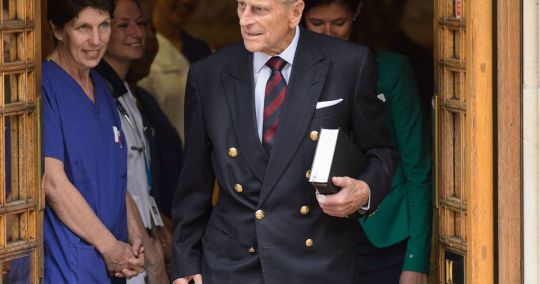
He didn’t have an entourage to fawn around him. He was the first to own a computer at Buckingham Palace. He answered his own phone and wrote and responded to his own correspondence. By force of character he fought the old guard courtiers at every turn to modernise the monarchy against their stubborn resistance.
Prince Philip was never given to self-analysis or reflection on the past. Various television interviewers tried without success to coerce him in to commenting on his legacy.But once when his guard was down he asked on the occasion of his 90th birthday what he was more proud of, he replied with characteristic bluntness: “I couldn’t care less. Who cares what I think about it, I mean it’s ridiculous.”
All of which neatly raises the profound aversion to fuss and the proclivity for tetchiness often expressed in withering put-downs that, for better or worse, will be the reflex memory for many of the Duke of Edinburgh. If character is a two edged sword so what of his gaffes?
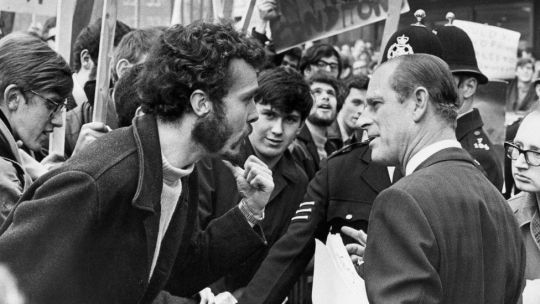
There is no doubt his cult status partly owed to his so-called legendary gaffes, of which there are enough to fill a book (indeed there is a book). But he was no racist. None of the Commonwealth people or foreign heads of state ever said this about him. Only leftist republicans with too much Twitter time on their hands screamed such a ridiculous accusation. They’re just overly sensitive snowflakes and being devoid of any humour they’re easily triggered.
There was the time that Philip accepted a gift from a local in Kenya, telling her she was a kind woman, and then adding: “You are a woman, aren’t you?” Or the occasion he remarked “You managed not to get eaten, then?” to a student trekking in Papua New Guinea. Then there was his World Wildlife Fund speech in 1986, when he said: “If it has got four legs and it is not a chair, if it has got two wings and it flies but is not an aeroplane, and if it swims and it is not a submarine, the Cantonese will eat it.” Well, he wasn’t wrong.
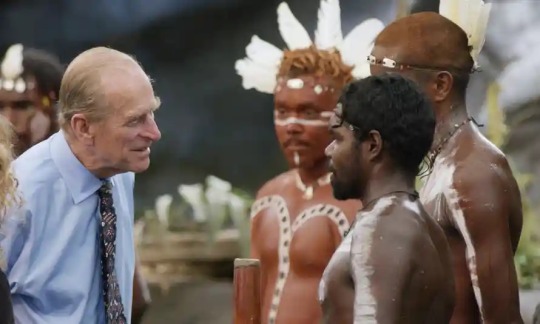
Philip quickly developed a reputation for what he once defined, to the General Dental Council, as “dentopedology – the science of opening your mouth and putting your foot in it”. Clearly he could laugh at himself as he often did as an ice breaker to put others at ease.
His remarking to the president of Nigeria, who was wearing national dress, “You look like you’re ready for bed”, or advising British students in China not to stay too long or they would end up with “slitty eyes”, is probably best written off as ill-judged humour. Telling a photographer to “just take the fucking picture” or declaring “this thing open, whatever it is”, were expressions of exasperation or weariness with which anyone might sympathise.
Above all, he was also capable of genuine if earthy wit, saying of his horse-loving daughter Princess Anne: “If it doesn’t fart or eat hay she isn’t interested.” Many people might have thought it but few dared say it. If Prince Philip’s famous gaffes provoked as much amusement as anger, it was precisely because they seem to give voice to the bewilderment and pent-up frustrations with which many people viewed the ever-changing modern world.
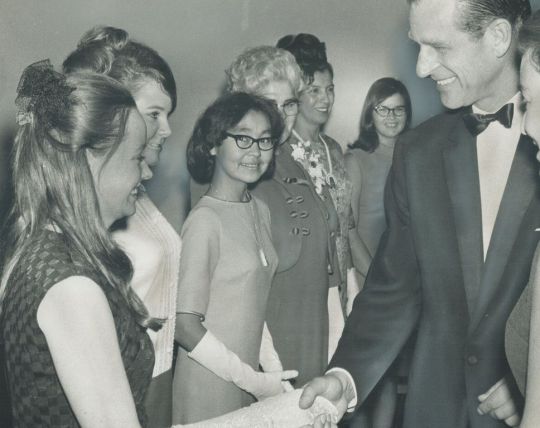
A former royal protection officer recounts how while on night duty guarding a visiting Queen and consort, he engaged in conversation with colleagues on a passing patrol. It was 2am and the officer had understood the royal couple to be staying elsewhere in the building until a window above his head was abruptly slammed open and an irate Prince Philip stuck his head out of the window to shout: “Would you fuck off!” Without another word, he then shut the window.
The Duke at least recognised from an early age that he was possessed of an abruptness that could all too easily cross the line from the refreshingly salty to crass effrontery.
One of his most perceptive biographers, Philip Eade, recounted how at the age of 21 the prince wrote a letter to a relation whose son had recently been killed in combat. He wrote: “I know you will never think much of me. I am rude and unmannerly and I say things out of turn which I realise afterwards must have hurt someone. Then I am filled with remorse and I try to put matters right.”
In the case of the royal protection officer, the Duke turned up in the room used by the police officers when off duty and said: “Terribly sorry about last night, wasn’t quite feeling myself.”
Aides have also ventured to explain away some of their employer’s more outlandish remarks - from asking Cayman islanders “You are descended from pirates aren’t you?” to enquiring of a female fashion writer if she was wearing mink knickers - as the price of his instinctive desire to prick the pomposity of his presence with a quip to put others at ease.
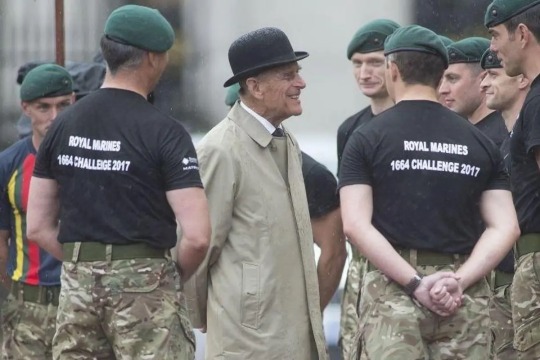
Indeed many people forget that his ‘gaffes’ were more typical of the clubbish humour of the British officer class – which of course would be less appreciated, sometimes even offensive, to other ears. It’s why he could relate so well to veterans who enjoyed his bonhomie company immensely.
But behind the irascibility, some have argued there also lay a darker nature, unpleasantly distilled in his flinty attitude to his eldest son. One anecdote tells of how, in the aftermath of the murder of the Duke’s uncle and surrogate father, Lord Mountbatten, Philip lectured his son, who was also extremely fond of his “honorary grandfather”, that he was not to succumb to self-pity. Charles left the room in tears and when his father was asked why he had spoken to his son with so little compassion, the Duke replied: “Because if there’s any crying to be done I want it to happen within this house, in front of his family, not in public. He must be toughened up, right now.”
But here I would say that Prince Philip’s intentions were almost always sincere and in no way cruel. He has always tried to protect his family - even from their own worst selves or from those outside the family ‘firm’ who may not have their best interest at heart.
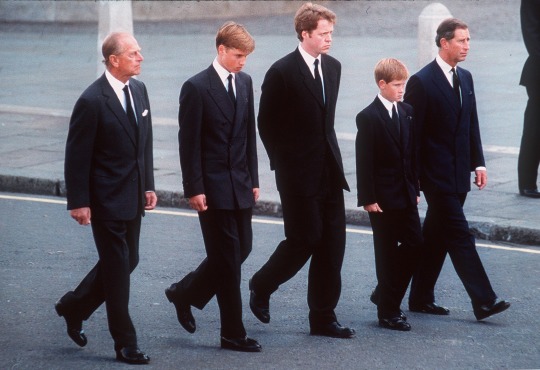
In 1937, a 16-year-old Prince Philip had walked behind his elder sister Cecile’s coffin after she was killed in a plane crash while heavily pregnant. The remains of newly-born infant found in the wreckage suggested the aircraft had perished as the pilot sought to make an emergency landing in fog as the mother entered childbirth. It was an excruciating taste of tragedy which would one day manifest itself in a very princely form of kindness that was deep down that defined Philip’s character.
When about 60 years later Prime Minister Tony Blair’s spin doctors in Downing Street tried to strong arm the Queen and the royal household over the the arrangements for the late Prince Diana’s funeral, it was Philip who stepped in front to protect his family. The Prime Minister and his media savvy spin doctors wanted the two young princes, William and Harry, to walk behind the coffin.
The infamous exchange was on the phone during a conference call between London and Balmoral, and the emotional Philip was reportedly backed by the Queen. The call was witnessed by Anji Hunter, who worked for Mr Blair. She said how surprised she was to hear Prince Philip’s emotion. ‘It’s about the boys,” he cried, “They’ve lost their mother”. Hunter thought to herself, “My God, there’s a bit of suffering going on up there”.’
Sky TV political commentator Adam Boulton (Anji Hunter’s husband) would write in his book Tony’s Ten Years: ‘The Queen relished the moment when Philip bellowed over the speakerphone from Balmoral, “Fuck off. We are talking about two boys who have just lost their mother”. Boulton goes on to say that Philip: ‘…was trying to remind everyone that human feelings were involved. No 10 were trying to help the Royals present things in the best way, but may have seemed insensitive.’
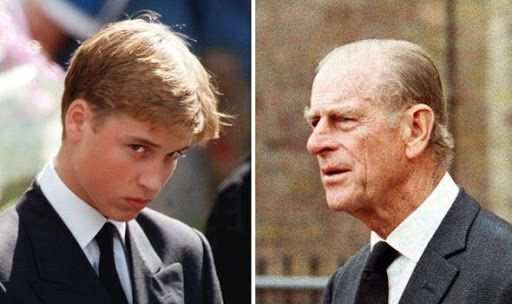
In the end the politicians almost didn’t get their way. Prince Philip stepped in to counsel his grandson, Prince William, after he had expressed a reluctance to follow his mother’s coffin after her death in Paris. Philip told the grieving child: “If you don’t walk, I think you’ll regret it later. If I walk, will you walk with me?”
It’s no wonder he was sought as a counsellor by other senior royals and especially close to his grandchildren, for whom he was a firm favourite. His relationship with Harry was said to have become strained, however, following the younger Prince’s decision to reject his royal inheritance for a life away from the public eye in America with his new American wife, Meghan Markle. For Prince Philip I am quite sure it went against all the elder Prince had lived his life by - self-sacrifice for the greater cause of royalty.
This is the key to Philip’s character and in understanding the man. The ingrained habits of a lifetime of duty and service in one form or another were never far away.
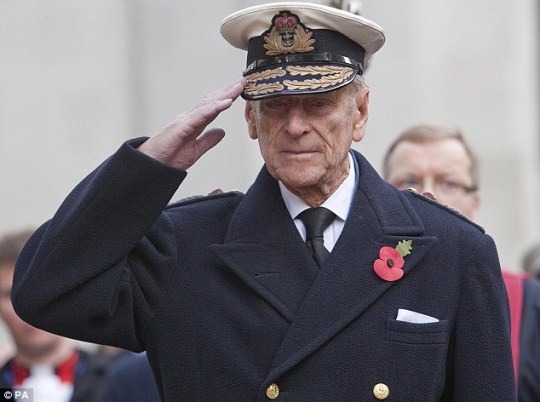
In conclusion then....
After more time passes I am sure historians will make a richer reassessment of Prince Philip’s life and legacy. Because Prince Philip was an extraordinary man who lived an extraordinary life; a life intimately connected with the sweeping changes of our turbulent 20th Century, a life of fascinating contrast and contradiction, of service and some degree of solitude. A complex, clever, eternally restless man that not even the suffocating protocols of royalty and tradition could bind him.
Although he fully accepted the limitations of public royal service, he did not see this as any reason for passive self-abnegation, but actively, if ironically, identified with his potentially undignified role. It is this bold and humorous embrace of fated restriction which many now find irksome: one is no longer supposed to mix public performance with private self-expression in quite this manner.
Yet such a mix is authentically Socratic: the proof that the doing of one’s duty can also be the way of self-fulfilment. The Duke’s sacrifice of career to romance and ceremonial office is all the more impressive for his not hiding some annoyance. The combination of his restless temperament and his deeply felt devotion to duty found fruitful expression; for instance, in the work of Saint George’s House Windsor - a centre and retreat that he created with Revd. Robin Woods - in exploring religious faith, philosophy, and contemporary issues.
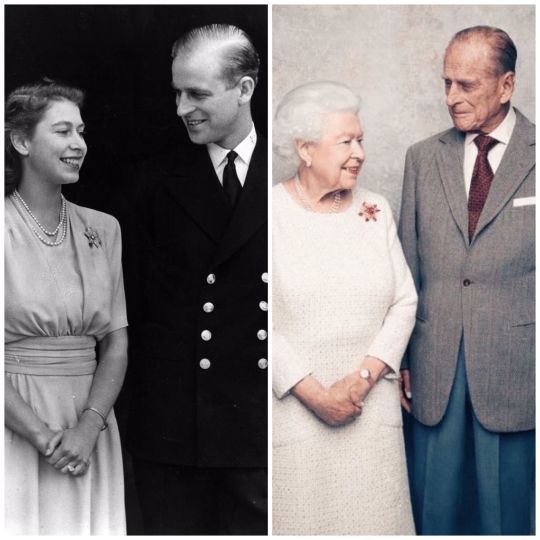
Above all he developed a way to be male that was both traditional and modern. He served one woman with chivalric devotion as his main task in life while fulfilling his public engagements in a bold and active spirit. He eventually embraced the opportunity to read and contemplate more. And yet, he remained loyal to the imperatives of his mentor Kurt Hahn in seeking to combine imagination with action and religious devotion with practical involvement.
Prince Philip took more pride in the roles he had accidentally inherited than in the personal gifts which he was never able fully to develop. He put companionship before self-realisation and acceptance of a sacred symbolic destiny before the mere influencing of events. In all these respects he implicitly rebuked our prevailing meritocracy which over-values officially accredited attainment, and our prevailing narcissism which valorises the assertion of discrete identities.
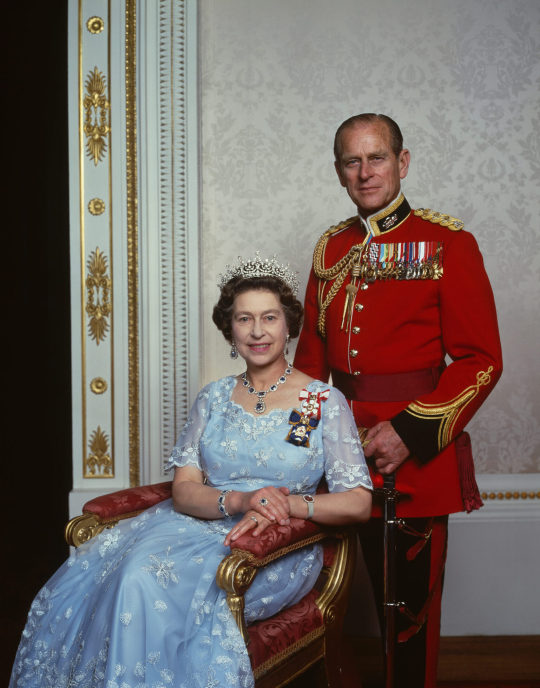
Prince Philip was Britain’s longest-serving consort. He was steadfast, duty driven, and a necessary adjunct to the continuity and stability of the Queen and the monarchy. Of all the institutions that have lost the faith of the British public in this period - the Church, Parliament, the media, the police - the Monarchy itself has surprisingly done better than most at surviving, curiously well-adapted to a period of societal change and moral anarchy. The House of Hanover and later Saxe-Coburg and Gotha (changed to Windsor), since their arrival in this country in 1714, have been noted above all for their ability to adapt. And just as they survived the Victorian age by transforming themselves into the bourgeoise, domestic ideal, so they have survived the new Elizabethan era (Harry-Meghan saga is just a passing blip like the Edward-Wallis Simpson saga of the 1930s).
There was once a time when the Royal’s German blood was a punchline for crude and xenophobic satirists. Now it is the royals who are deeply British while the country itself is increasingly cosmopolitan and globalised. British society has seen a greater demographic change than the preceding four or five thousand years combined, the second Elizabethan age has been characterised more than anything by a transformational movement of people. Prince Philip, the Greek-born, Danish-German persecuted and destitute wanderer who came to become one of the Greatest Britons of the past century, perhaps epitomised that era better than anyone else. And he got through it by making a joke of everything, and by being practical.
I hope I don’t exaggerate when I say that in our troubled times over identity, and our place and purpose in the world, we need to heed his selfless example more than ever.
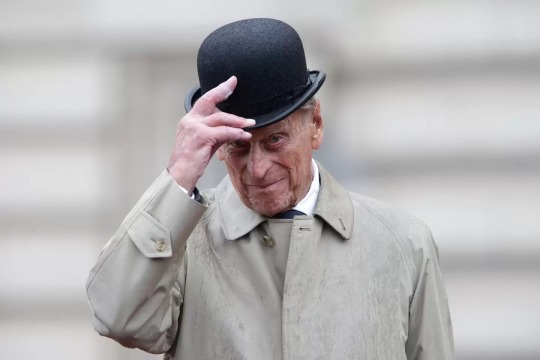
As Heraclitus wisely said, Ήθος ανθρώπω δαίμων (Character is destiny.)
RIP Prince Philip. You were my prince. God damn you, I miss you already.
Thanks for your question.
#question#ask#prince philip#duke of edinburgh#queen elizabeth II#the queen of spades#monarchy#britain#british#royalty#politics#history#culture#europe#crown#icon#great briton#society
284 notes
·
View notes
Link
I hit the breaking point as a parent a few years ago. It was the week of my extended family’s annual gathering in August, and we were struggling with assorted crises. My parents were aging; my wife and I were straining under the chaos of young children; my sister was bracing to prepare her preteens for bullying, sex and cyberstalking. Sure enough, one night all the tensions boiled over. At dinner, I noticed my nephew texting under the table. I knew I shouldn’t say anything, but I couldn’t help myself and asked him to stop. Ka-boom! My sister snapped at me to not discipline her child. My dad pointed out that my girls were the ones balancing spoons on their noses. My mom said none of the grandchildren had manners. Within minutes, everyone had fled to separate corners. Later, my dad called me to his bedside. There was a palpable sense of fear I couldn’t remember hearing before. “Our family’s falling apart,” he said. “No it’s not,” I said instinctively. “It’s stronger than ever.” But lying in bed afterward, I began to wonder: Was he right? What is the secret sauce that holds a family together? What are the ingredients that make some families effective, resilient, happy? It turns out to be an astonishingly good time to ask that question. The last few years have seen stunning breakthroughs in knowledge about how to make families, along with other groups, work more effectively. Myth-shattering research has reshaped our understanding of dinnertime, discipline and difficult conversations. Trendsetting programs from Silicon Valley and the military have introduced techniques for making teams function better. The only problem: most of that knowledge remains ghettoized in these subcultures, hidden from the parents who need it most. I spent the last few years trying to uncover that information, meeting families, scholars and experts ranging from peace negotiators to online game designers to Warren Buffett’s bankers. After a while, a surprising theme emerged. The single most important thing you can do for your family may be the simplest of all: develop a strong family narrative. I first heard this idea from Marshall Duke, a colorful psychologist at Emory University. In the mid-1990s, Dr. Duke was asked to help explore myth and ritual in American families.“There was a lot of research at the time into the dissipation of the family,” he told me at his home in suburban Atlanta. “But we were more interested in what families could do to counteract those forces.” Around that time, Dr. Duke’s wife, Sara, a psychologist who works with children with learning disabilities, noticed something about her students.“The ones who know a lot about their families tend to do better when they face challenges,” she said. Her husband was intrigued, and along with a colleague, Robyn Fivush, set out to test her hypothesis. They developed a measure called the “Do You Know?” scale that asked children to answer 20 questions. Examples included: Do you know where your grandparents grew up? Do you know where your mom and dad went to high school? Do you know where your parents met? Do you know an illness or something really terrible that happened in your family? Do you know the story of your birth? Dr. Duke and Dr. Fivush asked those questions of four dozen families in the summer of 2001, and taped several of their dinner table conversations. They then compared the children’s results to a battery of psychological tests the children had taken, and reached an overwhelming conclusion. The more children knew about their family’s history, the stronger their sense of control over their lives, the higher their self-esteem and the more successfully they believed their families functioned. The “Do You Know?” scale turned out to be the best single predictor of children’s emotional health and happiness. “We were blown away,” Dr. Duke said. And then something unexpected happened. Two months later was Sept. 11. As citizens, Dr. Duke and Dr. Fivush were horrified like everyone else, but as psychologists, they knew they had been given a rare opportunity: though the families they studied had not been directly affected by the events, all the children had experienced the same national trauma at the same time. The researchers went back and reassessed the children.“Once again,” Dr. Duke said, “the ones who knew more about their families proved to be more resilient, meaning they could moderate the effects of stress.” Why does knowing where your grandmother went to school help a child overcome something as minor as a skinned knee or as major as a terrorist attack? “The answers have to do with a child’s sense of being part of a larger family,” Dr. Duke said. Psychologists have found that every family has a unifying narrative, he explained, and those narratives take one of three shapes. First, the ascending family narrative: “Son, when we came to this country, we had nothing. Our family worked. We opened a store. Your grandfather went to high school. Your father went to college. And now you. ...” Second is the descending narrative: “Sweetheart, we used to have it all. Then we lost everything.” “The most healthful narrative,” Dr. Duke continued, “is the third one. It’s called the oscillating family narrative: ‘Dear, let me tell you, we’ve had ups and downs in our family. We built a family business. Your grandfather was a pillar of the community. Your mother was on the board of the hospital. But we also had setbacks. You had an uncle who was once arrested. We had a house burn down. Your father lost a job. But no matter what happened, we always stuck together as a family.’ ” Dr. Duke said that children who have the most self-confidence have what he and Dr. Fivush call a strong “intergenerational self.” They know they belong to something bigger than themselves. Leaders in other fields have found similar results. Many groups use what sociologists call sense-making, the building of a narrative that explains what the group is about. Jim Collins, a management expert and author of “Good to Great,” told me that successful human enterprises of any kind, from companies to countries, go out of their way to capture their core identity. In Mr. Collins’s terms, they “preserve core, while stimulating progress.” The same applies to families, he said. Mr. Collins recommended that families create a mission statement similar to the ones companies and other organizations use to identify their core values. The military has also found that teaching recruits about the history of their service increases their camaraderie and ability to bond more closely with their unit.Cmdr. David G. Smith is the chairman of the department of leadership, ethics and law at the Naval Academy and an expert in unit cohesion, the Pentagon’s term for group morale. Until recently, the military taught unit cohesion by “dehumanizing” individuals, Commander Smith said. Think of the bullying drill sergeants in “Full Metal Jacket” or “An Officer and a Gentleman.” But these days the military spends more time building up identity through communal activities. At the Naval Academy, Commander Smith advises graduating seniors to take incoming freshmen (or plebes) on history-building exercises, like going to the cemetery to pay tribute to the first naval aviator or visiting the original B-1 aircraft on display on campus. Dr. Duke recommended that parents pursue similar activities with their children. Any number of occasions work to convey this sense of history: holidays, vacations, big family get-togethers, even a ride to the mall. The hokier the family’s tradition, he said, the more likely it is to be passed down. He mentioned his family’s custom of hiding frozen turkeys and canned pumpkin in the bushes during Thanksgiving so grandchildren would have to “hunt for their supper,” like the Pilgrims. “These traditions become part of your family,” Dr. Duke said. Decades of research have shown that most happy families communicate effectively. But talking doesn’t mean simply “talking through problems,” as important as that is. Talking also means telling a positive story about yourselves. When faced with a challenge, happy families, like happy people, just add a new chapter to their life story that shows them overcoming the hardship. This skill is particularly important for children, whose identity tends to get locked in during adolescence. The bottom line: if you want a happier family, create, refine and retell the story of your family’s positive moments and your ability to bounce back from the difficult ones. That act alone may increase the odds that your family will thrive for many generations to come.
- Bruce Feiler. Emphases added.
125 notes
·
View notes
Note
my sweet darling - how about an armed forces 911 AU? Maybe Eddie meets Navy Seal Buckley overseas? Maybe they meet back stateside at the VA?
You, my darling, always send me such fun and interesting prompts. I promise I didn’t forget.
Ooh, okay. Let’s see...
Prompt Me with AUs
Delta X-Ray (I am Sinking)
Read on Ao3
Eddie first sees him as he’s getting off the plane in Washington. He’s going to receive a medal. Apparently his work in Bagram made him a hero and not a broken, shell of a man. Who knew. And really, it’s just a glance because he has other things to worry about besides a Navy man getting dressed down by his captain. He doesn’t need to hear what’s being said to know that’s exactly what’s happening. He’s seen that look too many times, felt the hot breath of his superior as they spat harsh words meant to ‘toughen him up’.
As he passes the sailor, he hears something to the effect of “if it happens again, you will be dismissed.” And Eddie wonders how many times this particular man has received this exact lecture. It doesn’t really matter, anyways. He just wants to get his medal, shake a few hands of politicians who think they had anything to do with his ‘accomplishment’ and go home to his wife and child – ex-wife, he reminds himself. Shannon had the papers shipped to Afghanistan. Couldn’t get away fast enough, his mind bitterly supplied. All he would have at the end of the day was his son, and a medal to replace the wedding band he’d worn since he was 19.
Before he knows it, he’s standing on a small stage, a million lights flashing in his eyes as cameras and stage lights practically blind him. His shoulder aches – out of the sling for the afternoon so he can at least look more put together than he feels – and he’s dizzy from the attention. That’s his excuse for why he doesn’t recognize the man standing beside him.
“Seaman Petty Officer First Class Evan Buckley.” A blond man steps forward and Eddie catches himself staring at the dress whites and stone expression for longer than is strictly necessary. He seems a far cry from the officer being scolded less than an hour ago, but it is definitely him. And he was standing on stage beside Eddie, about to receive a medal of his own.
“For distinguishing oneself by heroism not involving actual conflict with an enemy of the United States, Petty Officer Buckley is awarded the Navy and Marine Corps Medal.”
As he watches the stripes being pined on the officer’s lapel, he lets himself wonder what crime the man could have committed to be dressed down and rewarded in the same afternoon.
He’s so curious, in fact, that he nearly misses his own name amongst the titles thrown around.
“Staff Sergeant Edmundo Diaz.” He steps forward, holding his breath until the entire ordeal is finally finished. “For gallantry in action against an enemy of the United States, Staff Sergeant Diaz is awarded the Silver Star.” The medal is heavier than he anticipated, but he supposes that makes sense. It is quite a burden he’ll be carrying around, and now he has a gold star to go with it – he wants to chuckle at the irony of his ‘Silver Star’ actually presenting as a golden one.
It seems everything about his life is a life.
There were a lot of reasons Eddie hated attending events like this: The politics, the bravado, the crowds of people ‘thanking him for his service’. Mostly, though: he never knows anyone. Sure, he can charm a senator or two for a few minutes, swap stories with other officers from other divisions about where they were and what they saw. But those are fleeting relationships, meant to get him through the day. He’ll go back to his hotel room at the end of the night with no more friends than when he’d stepped off the plane in this awful, awful town. Eddie is tired of ‘schmoozing’. With any luck, today will be the last time he has to tell the governor’s wife how lovely she looks in her dress.
That’s when he spots the man sitting at the edge of the bar like he’s trying to hide from the world, and he decides to make his way over.
“Do you mind if I join you?” He asks, even as he sits down.
The other man’s eyes light with recognition – and damn, are they as blue as the sea. “Not at all. Diaz, right?”
“Eddie.” He supplies, raising a finger to the bartender to snag his attention. If he is going to make it to the end of the evening, he’s going to need one, good drink. “And you’re Buckley.”
“Actually, it’s Evan but you can call me ‘Buck’.” His amusement must be evident because his new drinking buddy supplies the answer. “There are a surprising amount of ‘Evan’s in the Navy.”
It had never occurred to him to check how many ‘Eddie’s were in his squadron. Maybe he should ask his CO if that’s why he always called him by his full first name.
“Congratulations, by the way.” Buck looks somewhat nervous even as the words leave his mouth. “On your medal. Good job.”
“Oh.” Is all Eddie can bring himself to say as he stares into the bottom of his glass. “Thanks.”
“You don’t look too happy about it.”
He really isn’t doing a good job of hiding his emotions if this relative stranger ca read him so easily. “No, I-” he takes a deep breath to recalibrate his thoughts and paste his best fake smile. “It is a great honour.”
“Bullshit.” Buck laughs in his face but for some reason, Eddie doesn’t bristle nearly as hard as he expected. It almost feels playful. The rest of Buck’s response is cut off by his buzzing phone on the counter. The man quickly grabs it long enough to check his notifications, returning it to its place at the bar with a disappointed look.
“Are we keeping you from something?”
“Uh, no.” It’s Buck’s turn to look caught out and in need of recalibration. His expression changes much slower. “I’m just waiting for a call from my sister. I sent her an invitation to this thing but she never responded.”
Eddie has experience with family not coming to big social events like this one. Of course, in his case, he never invited them in the first place.
“Family ain’t easy.” He shrugs as he takes a long sip of whatever burning liquid he’d ordered – it really doesn’t matter so long as he can stay sitting here and not mingling with the crowds of vultures.
“It’s more than that.” Buck looks worried, and the way he bites his lip is… Eddie shouldn’t be focusing on that. “It’s just…” The man shakes his head, dismissing whatever feelings were eating at his gut. “I don’t want to bore you.”
“Please.” Eddie leans into his space with a playful smile. “It can’t be any more boring than this event. Please try to bore me to tears, if you dare.”
When Buck smiles, Eddie’s heart flutters out of his chest and sits beside him as they listen to Buck begin to speak. He tells Eddie about his sister, how she cared for him growing up, how she went away with her asshole of a boyfriend – now her deceased asshole of a husband – leaving him to fend for himself. He talks about travelling the country, trying every odd job he could get his hands on, until a buddy of his suggested he join the Navy. And he loves the work, he really does, but he hasn’t seen his sister in over a year. Their last conversation ended in a fight about some family secret that Buck is reluctant to talk about. Even Eddie can tell that the man just misses his sister. No matter what the argument was about.
Eddie finds himself talking – in less detail – about Shannon and the divorce and his son at home. At Buck’s prompting, he shows off his favourite photos of Christopher (avoiding the one burning a whole in his shirt pocket, torn and bloody, which never leaves him). The man’s face positively lights up when he sees the kid, offering an appropriate amount of sympathy for his divorce without pushing him for more emotions.
It’s easy talking to Buck, he realizes after a few hours. Because suddenly, the venue rental is nearly up and he’s still sitting at the corner of the bar, talking to Buck. Sure, a few people have passed by and shaken their hands, thanking them for their service – Eddie cringes every time and Buck has to hide his laughter once he realizes – but for the most part, it’s just the two of them, sitting and talking.
“The flag signalling we use now was established in 1855.” Buck explains as he leans further into Eddie’s space. “And while Robert Morse invented Morse Code in the 1830s, the International Morse Code that we use didn’t come out until the 1850s.”
“How do you know all of that?” Eddie was fairly certain he hadn’t had to study the history of communication when he was in training. But he’d also been very focused on his medical textbook.
Buck was incredibly cute when he blushed, Eddie decides – though he opts to keep that opinion to himself for now. “I get bored and I read.” The man shrugs nonchalantly, as though he hasn’t been entertaining Eddie with stories of Naval history and his own dumb-ass mistakes all evening. Honestly, Eddie wants to sit here all night and listen to Buck tell him stories of the world. It seems like he’s lived a lifetime already. And what has Eddie done? Gotten a girl pregnant, joined the army, gotten shot, and now he doesn’t even have a wife to go home to.
“Can I ask you something?” Eddie realizes too late that Buck looks nervous. He thinks he probably wouldn’t have said yes if he’d noticed. “How did you get your medal?”
Now he knows he doesn’t have to answer – and his initial instinct is to close out his tab and see if he can run to El Paso on his still-injured leg. But he also realizes that he hasn’t told anyone since it happened. Not the full story. Even now, he might not have the words. But he tries.
“Our helicopter got shot down while transporting wounded. I could still move so I got everyone out. Or I tried to get them out.” The echo of gunfire is not as distant as the others told him it would be. He can still smell it. “Support finally arrived and they decided to give me a medal for holding down the fort.”
Buck places a gentle hand over his and Eddie gasps, reminded that it has been a very long time since anyone has touched him. God, how he misses it.
“You saved wounded soldiers in the middle of the desert while being fired on. And you think you were just doing your job?”
“I’m an army medic.” He reasons with the bottom of his glass. “It’s my job to save people.”
“Maybe. But I don’t think that’s why you do it.” Without elaborating, Buck smiles at him and Eddie forgets the question.
“What about you?” He asks instead. “What’s yours for?”
Unlike the enthusiastic, bubbly personality he’s been talking to for the last few hours, Buck melts into the face he saw up on that stage. The stoic, professional.
“We were on our way back from an escort mission when we encountered some rough seas. I happened to be on deck with the chief mate when he had a stroke. I tried to tend to him but the storm was getting worse and no one could find the captain, so I just took over navigation. It was rough, I had no idea what I was doing, but we all made it out safely and the chief mate was okay.” As Buck shrugs, memories of an overheard conversation come flooding back to Eddie’s mind.
“Wait, were you on the USS Angelo?”
“Yeah. Why?”
Eddie can’t believe it. He has to laugh. “You were the cadet who sailed out of Hurricane Ida?”
“I am a petty officer first class, I’ll have you know.”
“Buck, you navigated a 2,000 ton ship out of a hurricane and all they gave you was a lousy medal?”
“I should get that printed on a t-shirt, or something.”
“That was incredibly reckless but also incredibly brave. Buck, you’re a hero.”
“I was just doing my job.” The smirk tells Eddie he knows exactly what he’s doing but it still hits him that he’s throwing Eddie’s words back in his face. Cute and cheeky.
He doesn’t know why he asks – well, he does, but it’s incredibly stupid and impulsive, and he definitely can’t blame it on the alcohol but he sure would like to.
“How long are you in town?”
Buck looks pleasantly surprised by his question but answers with regret in his eyes. “I head out with the Fifth Fleet in the morning.”
Wow. “You just got a medal, and you’re headed out to earn another one?”
“Something like that.” Buck laughs and Eddie wishes he was braver than he felt. “But I won’t be gone forever. And I’m really good at telegraphy if you wanted to send anyone a message.”
He’s so grateful that Buck has the good sense to be everything he needs right now. Because asking the next question is easier with someone standing next to him. “I suppose I’ll need a way to get in touch with you, then.”
Buck winks and Eddie has never been gladder that the concept of ‘standing’ was only metaphorical. The man should not be so irresistible after only a few hours, but Eddie can’t help but watch him push off his barstool and walk around the side of the bar.
“Hey, Diaz!” The spell is broken long enough for him to look across the room at where his name is being called. He waves at old friends – well, Senior Airman Han and Space Force First Sergeant Wilson are the closest things he has to old friends but in actuality, he’s not sure he knows their first names. “We’re going to the afterparty, want to join?”
On a normal night, Eddie would decline on the basis that he doesn’t want to go, and would rather lay in bed and watch reruns of ‘Murder She Wrote’. Tonight, Eddie wants to decline on the basis that he doesn’t want to go, and would rather stay up all night talking to someone who makes me feel curious about the future.
“Not tonight.” He shouts back across the room. “I’ll catch you at the next ceremony.”
They wave him off because they know it’s the same excuse he makes every single time but the only thing that matters is getting back to Buck.
“So.” He turns to the bar only to find it empty. The seat beside him is also unoccupied, as is any of the space surrounding him.
Had he dreamed up Buck? Had he been imagining this person who made him feel like divorce wasn’t his last chance at happiness? Was he truly so desperate and lonely?
“Hey.” Eddie looks up with too much hope in his eyes to only come face-to-face with the bartender. “He left this for you.” The man – who is not Buck, no matter how much Eddie hopes to see those eyes again – slides a napkin across the counter and walks away before Eddie can ask anymore questions.
He picks up the napkin and reads the blue ink-stained note written in messy scrawl.
Kilo
--... .---- --... ..... ..... ..... -.... --... ----. .----
The dots and dashes he recognizes as a series of numbers – a phone number, he hopes – but the word above? He tries to recall his academy days.
Kilo. Short for Kilogram. Used in the International Code of Symbols to represent the letter ‘K’. In Maritime Signal Flags, it indicates: I wish to communicate with you.
He’s pretty sure the bartender hates him for how late he stayed and how loudly he laughed at Buck’s note, but he can’t bring himself to care. Instead, he spends his energy memorizing the napkin’s contents long after he’s input the number. It’s more than just a piece of paper: it’s hope.
#military au#911 on fox#911 fox#buddie#eddie diaz#evan buckley#buddie fic#911 fic#first meeting#cj answers things#florenceandthemachine#cj writes things#love flo
75 notes
·
View notes
Text
Make it Work: Chapter 5
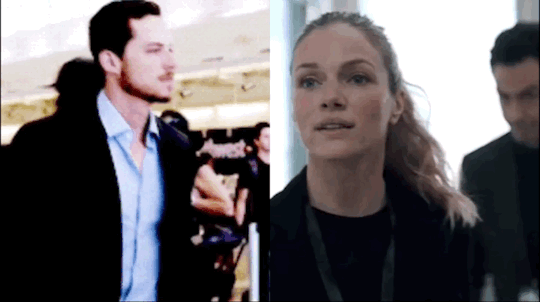
Summary: When offered a permanent position with the FBI, Hailey agrees to take it under one condition: Jay comes too. As their personal lives and work lives begin to change, the two partners find it increasingly difficult to navigate their complex relationship and manage their feelings for one another.
Writer’s Note: I want to first apologize for taking so long to update this fic. I took a break to finish up school related things, and then when I came back to writing I was feeling very uninspired with this chapter. Nevertheless, I pushed through and what I thought was going to be a bland filler chapter ended up being a really fun chapter to write. Starting today, I am back to posting chapters weekly! Please enjoy & I want to thank everyone who has read/supported this fic. As LaRoyce always says: From the heart ❤️
TW:// mentions of PTSD
Tagging: @angelsjedi , @brookerz122493 , @cpdfan2014 , @the–carousel , @maya-asturias , @itsdesiree86 , @tvshowsaremyhappyplace
Read on AO3 or below
It had been two weeks since their first day at the FBI, and Jay and Hailey had finally found a comfortable rhythm. For Jay, it took a while to get used to solely being a field agent. Part of him missed digging for intel themselves. He missed the long nights in the wire room and the early mornings organizing the case board, but the fieldwork mostly made up for that part of the job he missed. He loved being out on the streets, and in his eyes, nothing could beat the satisfaction of finally putting the offenders in cuffs.
The team was still rolling as a quartet, with Hailey still partnered with Walker and Jay with Daisy. For the most part, they were all out in the field together, but some instances required the pairs to break apart. He and Daisy’s partnership was working, but they didn’t function in the same natural way he and Hailey always did. He missed riding with her, but he was making do with the current arrangement until their training period was up. Overall, he was fond of Daisy. She was competent, cool under pressure, and she had his back when it counted, so he grew to trust her a great deal. Walker was another story. He was good at his job, there was no doubt about that, but he had a way of running his mouth that made Jay want to keep his distance. Things had been icy since they were at each other’s throats on the first day when Jay’s concern for Hailey got the best of him. They were able to patch things up, but Jay knew they weren’t going to be best friends anytime soon. He also didn’t like the way Walker interacted with Hailey. Other than what Jay identified as obvious flirting, he had a way of coddling her that, from Jay’s eyes, demeaned her and her abilities. He wasn’t sure if she didn’t notice it or if she was choosing to ignore it for the sake of avoiding conflict, but she never called him out for it. At least not when Jay was around. So, he never questioned it. He trusted her. Since it didn’t visibly bother her, he tried to not let it bother him either.
“Excited to have your favorite partner back?” Jay asked as he and Hailey climbed onto the elevator. It was officially their first day of partnering together as agents, and he couldn’t have been happier.
“Wait, Vanessa joined the FBI?” she joked, feigning a look of surprise.
“You think you’re funny, don’t you?”
“Nope. I know I’m funny,” she smirked back.
“How is she by the way?” Jay asked, inquiring about her former roommate and best friend. Not long after Hailey went to New York the first time, Vanessa was picked out of Intelligence by Major Crimes to do a long-term undercover sting. She didn’t get to say a proper goodbye to Hailey, something they were both sad about, but they remained in touch through an occasional text.
“She can’t communicate much, but when she does she seems good. You know her, she’s a natural-born UC. Quick on her feet,” she said briefly. Jay nodded, noticing a slight drop in her mood as she spoke about her. He knew the connection those two had. Hailey looked out for her, almost to a fault as it was her attempt at protecting Vanessa and her childhood friend that got her sent to New York in the first place. He knew it killed her to not get to say a proper goodbye, and he could see it in her face in that moment. He decided to change the subject to get it off her mind.
“So, are you going to miss partnering with Walker at all?” Jay asked, slightly nervous to hear her answer.
“Mm, not really. I mean he’s a great agent and all, but he’s just too much in his own head. We connected pretty well with small talk and all that, but I felt like I had to keep a constant eye on him in the field. We just didn’t work well together. Not like you and me anyway,” she admitted, flashing him a brief smile. It was contagious and he turned his head to the side to conceal the one erupting across his face.
It relieved him to know that she didn’t feed into whatever connection Walker was trying to build between them. It made him even more relieved to know that they were back together as partners, something he was counting down to since their first day on the job.
Things jumped off the second they stepped into the bullpen. Drake briefed the team on the case the minute they walked in the room. A rogue member of an anti-military activist group in the city exposed the group’s plans to target a veteran’s convention at the Javits Center in Midtown. Being that their intel came from an insider, the group was oblivious to the bureau’s knowledge of their plans. Drake tasked Jay, Hailey, Walker, and Daisy with attending the convention, posing as veterans as they worked to smoke out the guys before they could carry out their plans. As Drake, a former Naval Officer briefed the case, Jay picked up on some tension and anger in his voice. He recognized it easily because he felt it himself. He pretended he didn’t notice when Hailey’s eyes began to survey his face, what he guessed was her way of trying to read his reaction to the case. He tried his best to remain stone faced, but he knew she could tell something was up just by looking at him.
If they had caught the case a few years prior, he would have gone to a much darker place, acting on rage rather than ration. However, through his therapy sessions over the years, he had learned to manage the emotions that only things related to the service could elicit. Once Drake was finished briefing everyone, he assigned the teams their positions and sent them on their way. As Jay turned away to head to the locker room to change, Drake called out to him.
“Jay, hang back a second?” He asked him. Jay sent Hailey a small wave, signaling her to go on without him. He followed Drake to his office, shoving his hands in his pockets after he closed the office door behind him.
“Something wrong, sir?” Jay asked, confusion in his voice.
“Jay, I know you’ve got a background in the military. I don’t have to imagine what’s going through your head right now, because it’s going through mine as well. But we need to play this one by the book, so I just need to know if I need to keep a leash on you today,” Drake spoke shortly.
“I’m straight, sir. You don’t have to worry about me, I’ll keep in check,” Jay assured him, nodding his head with his words. His boss bobbed his head slowly as if he were debating whether or not to accept his assurance.
“Let me know if that changes,” he replied quietly, sending the agent a trusting nod.
“Will do,” Jay returned before turning to leave the office.
He quickly changed and made his way to the elevators to head down to the garage. His mind flickered back to his time in country. The faces of the six friends he lost before he came home and his best friend Mouse who was there currently flooded his head with memories. He tried his best to shake them off as the elevator descended towards the garage. The case was stirring up something in him, but he was determined to center his focus on the job and not let it take over. The doors opened and he stepped out, tracking his footsteps with his eyes as he walked. When he looked up, Hailey was slumped against the car. When she saw him, she bounced herself off of it with her foot and walked in his direction.
“Everything okay?” She asked, a look of concern plastered across her face.
“Yeah. Drake just wanted to make sure my head was on straight today… with my military background and all,” he said, his eyes darting around the garage to avoid hers.
“Mm,” she hummed. “Let me know if I can take anything off your plate. You know I’ve got your back,” she told him warmly, peering into his eyes with a look of sincerity.
“I know. I appreciate it,” he told her, forcing a smile.
“Anyway, check out our rig,” she said sarcastically, gesturing to the bureau-issued black SUV behind her. “It’s very unique and way better than your old truck,” she mocked, smiling as she tried to lighten the mood.
Against his best efforts, a smile crept away from his mouth as her weak attempt at cheering him up succeeded. Her head tilted as her eyes looked over at him with a glimmer he had only noticed a few other times before.
“C’mon. Let’s take this baby for a spin,” she finally told him, tossing him the keys as she made her way to the passenger side of the car.
Jay’s nerves picked up when they arrived at the convention center. Since they were going in undercover, they had changed into street clothes to blend in. He had chosen one of his old Ranger shirts and jeans, and Hailey opted for a plain white t-shirt and jeans. When they got out of the car, she reached into the backseat, grabbing a ball cap and securing it on her head before closing the door. The word “Navy” was written across it in yellow letters. She didn’t wear hats often, but Jay admired when she did. They suited her, however seeing her rep the Navy stung him a bit.
“You just had to choose Navy didn’t you,” he mocked at her with a scoff, knowing she could have chosen any branch to represent as they attempted to blend into the crowd.
“What?” she feigned ignorance as Jay gave her a look of annoyance. “Drake loaned it to me,” she told him, turning her head up and brushing past him towards the entrance of the building.
“Mm. You know you always could have just borrowed something of mine,” he called after her, taking quick strides to catch up.
“Yeah, but then I wouldn’t have been able to see that look on your face,” she teased, her attention remaining straight ahead as she smirked slyly. He shook his head with a childish frown as he followed her to the entrance of the building.
Immediately upon walking through the doors, they caught sight of Daisy and Walker waiting for them under a welcome sign. They checked in and grabbed their name tags, before walking over to the two agents to convene before they set out into the center to try and track down the activists. Based on the intel provided by the whistleblower, they learned that the plan was to send in five members, each armed with undetectable weapons to disperse into the convention center and target high-ranking officials from each branch of the military. There was a panel later in the afternoon in which these individuals would all be on stage, the perfect opportunity to carry out the attack. Intel also revealed the individuals would be wearing red shoelaces so that they could spot each other in the crowd, a tidbit the four of them were happy to use to their advantage.
“Four of us, five of them. We need to split up. Hailey and I can take the first and second floor, you guys take the third and fourth. We each get a floor and call for backup the second we find any of these guys. If you spot one, take them down quietly, we can’t risk them alerting the others,” Jay commanded, taking point on the operation. They all nodded before breaking off and heading towards their separate floors.
“I’ll take the second floor,” Hailey told him, moving past him to climb the stairs.
“Wait,” he called after her, grasping her wrist lightly to stop her.
She looked down at his hand on her wrist, her eyes lingering for a moment before swallowing hard and bringing them back up to meet his. He quickly released his hand, bringing it to his pocket before he spoke.
“I- Just be careful, yeah?” He said simply, avoiding what he originally intended to say. Despite what he previously told both her and Drake, the case and being in a room full of veterans was affecting him more than he would have liked to let on. He almost told her this, hoping she’d have something to say that would help calm the jumbled mess going on in his brain. Yet, he realized she would just worry more and insist on staying together as they sought out the targets, and they needed to split up for time’s sake. So, before the words could leave his mouth, he asked for reassurance of the only other thing on his mind. Her safety.
Her brow furrowed at his words almost like she knew that wasn’t what he wanted to say, but she just nodded simply in affirmation. She brought a fist to bump his chest lightly before turning back and once again heading toward the stairs. He took a deep breath and recited the prayer of St. Christopher his mother made him and Will memorize when they were younger. These were grounding techniques he learned during his time in therapy. When he first started therapy, he thought the techniques were bogus, but he came to learn they really helped him cope when things began to trigger him.
He took one final breath before making his way through the crowd of people, glancing down at the floor every few seconds to survey the shoes of those around him, trying to spot any glimpse of red he could.
Half an hour had passed, and it had been radio silence over the coms. He knew the operation would be difficult, but he thought for sure by that point they would have found at least one of the offenders. Just as he began brainstorming different strategies in his head, he caught a glimmer of red on the floor, doing a double-take and stopping in his tracks to confirm his mind wasn’t playing tricks on him. The red shoelaces were there, plain as day, and the man wearing them was by himself, surveying the crowd nervously.
“I’ve got one of the targets. First floor near the east corner by a couple of food vendors. I’m moving in now, meet at the rendezvous,” he said into the coms before walking towards the coffee stand to his right. He grabbed a coffee, filling the cup with cream to cool it down before walking towards the target. A few steps away from the man, he faked a trip, sending the contents in the cup all over him.
“Woah, I’m so sorry, man,” Jay called out, reaching for napkins to try and help the man dry his drenched shirt.
“What the hell is your problem?” The guy questioned, a look of fury on his face.
“That is totally my bad. I’m such a klutz. I didn’t see that bump on the floor,” Jay told the man, handing him napkins as he attempted to pat his shirt dry. “Hey, you need to get that under some water. The men’s room is right around that corner and I think there were hand dryers in there,” he said, pointing around a corner. The man angrily turned, making his way in the direction Jay had just pointed to.
“Eyes up, he’s coming your way,” he said into his mic.
They grabbed the man up, locking him in a backroom the convention center had provided to them for detainment. The hope was that they could get him to give up the location of the other men, but his silence proved he wasn’t giving anything up.
“Why don’t you two keep questioning him, Daisy and I will go back out there and sniff the rest of these guys out,” Walker told the two partners. Jay clenched his jaw tightly as he eyed the target on the other side of the room. He hadn’t had the chance to question him yet, but he already knew whatever he had to say was going to just piss him off.
“You okay for that?” Hailey asked, turning to face him. Her eyes were cut up at him under the brim of her hat, and there was an earnest look on her face as she awaited his response.
“What do you mean by that?” Walker questioned before Jay could answer. He and Daisy weren’t aware of his history, certainly not in the way Hailey was. The last thing he wanted to do in that moment was dish out the details of his PTSD.
“Nothing,” he told the man bluntly before turning back to Hailey. “I’m fine, really,” he told her. As convincing as he tried to be, her eyes loitered on his face as she tried to measure the truth behind his words.
“You guys go ahead, we’ve got him,” she finally told the other two agents before they hesitantly turned on their heels to head back into the convention center. The second they were gone she stepped closer to him so she could speak to him without the man hearing.
“Look, I’m trusting you here, but the second you start to cross a line, I’m pulling you. This isn’t Intelligence. We can’t take the same risks here that we could under Voight. Understood?” She told him in a low voice. He bobbed his head up and down in agreement before making his way over to the man.
When they first detained the guy, they snapped a picture and sent it back to the analysts at headquarters to get an ID. Jay scanned the man’s file on his phone before slowly making his way over to him. He took a chair and sat it across from the man, turning it so he could sit with his arms crossed over the back of it.
“Mark Jones. You are quite the model citizen. Numerous charges for assault and battery, disturbing the peace, unlawful assembly, multiple violations of restraining orders, the list really goes on. But I don’t care about all of that. I care about why you’re at a veteran’s convention considering how public you’ve been about your hatred for the military,” Jay said, his eyes staring daggers into the man’s face.
“I ain’t talking to you. You’re just another pawn in the game. Too stupid and brainwashed to realize you guys are just a bunch of empty-headed murderers, blindly following whatever our so-called government tells you to,” the man spat back.
Murderers. The word made faces appear in Jay’s head. Faces of those he had killed both in Afghanistan and in Chicago. Faces he had spent years tormented by. He took several deep breaths, trying to ground himself. To keep from losing control. He looked over at Hailey who stood beside him, her arms crossed as she glared at the man across from them. Her attention turned to him and the expression on her face remained the same while the look in her eyes adjusted, sending him a soft message of support. This reassured him and he took one last deep breath before turning his attention back to the man.
“Where are the others?” Jay questioned, dragging out each word through clenched teeth. The man only gave him a snarl and an evil smile. He knew he was rattling Jay, and that only got him even more riled up.
“Ranger, huh?” He asked, avoiding Jay’s question completely and reading the letters across his shirt. “Y’all are the worst ones of them all. What’s your body count?” The man questioned, shifting his eyes from Jay to Hailey. “Baby blues here probably wouldn’t even be able to look you in the eyes if she knew how many, am I right?” The man laughed. Jay let out an annoyed laugh, staring into the space behind the man silently. His tongue trailed the back of his bottom teeth, the rage burning inside him and churning with every word that left the man’s mouth. Suddenly, he stood from his chair, kicking it towards the man aggressively before grabbing him by the collar. Almost immediately, he felt Hailey tugging at his arm to pull him off.
“You’re done, back up or get out,” she told him assertively. He continued scowling at the man, not moving from his position. She pushed against his chest, dropping her tone. “Jay, I’m serious. I’ve got this, stand back,” she told him in a whisper. Her voice snapped him out of the state he was in, and he threw his hands up, backing up and making his way to the wall on the other side of the room.
Jay’s ears rang as he blankly watched Hailey question the man. The room felt like it was spinning and whatever words were being exchanged between the two weren’t registering inside his head. All he could hear was a ringing in his ears, and what sounded like his heart beating out of his chest as his breath and heart rate increased out of control. He closed his eyes and took a breath. In for seven, out for eight. He quietly whispered the prayer of St. Christopher once again.
Grant me, O Lord, a steady hand and watchful eye, that no one shall be hurt as I pass by. You gave life, I pray no act of mine may take away or mar that gift of Thine. Shelter those, dear Lord, who bear my company from the evils of fire and all calamity.
When he opened his eyes, he was startled to see Hailey slowly and cautiously making her way toward him. Her brow was raised at him, and she turned around to look at their detainee before grabbing at Jay’s forearm and dragging him around the corner gently, out of the man’s sight.
“Are you good?” She questioned, a fearful look on her face and deep concern in her voice.
“Yeah,” he told her unconvincingly. But the rapid beating of his heart and the fog in his brain said otherwise. Almost like he had lost control of his body, he blurted out the word “no” as he shook his head. “I just, I-“ there was desperation in his voice, and the words fell out between irregular breaths. He noticed Hailey’s eyes begin to gloss over and she removed her hat, placing it on a chair beside them before closing the space between them. She then reached down to grab his hand, raising it to place it over her heart, keeping it there with her hand pressed tightly over his. This froze him, causing him to lose his breath completely as he brought his eyes down to meet hers. Any other time the touch would’ve had his heart racing, but somehow in that moment, it was what was calming him down.
“Jay, just control your breathing. Feel my heart beating, feel my hand against yours. You’re in America. You’re in New York. We’re both right here together, and you’re okay,” she whispered, taking deep breaths. She counted out her inhales and exhales, urging him to match her pattern of breathing. After a few moments like that, his breathing became normal again and they separated, taking a step back after releasing from each other’s touch.
“I’m sorry,” he told her, feeling embarrassed and vulnerable for letting her see that side of him.
“No, do not be sorry. You have nothing to apologize for.”
He nodded. “How’d you know what to do?” He questioned, picking up on the ease in which she was able to help him overcome the episode.
“After watching you deal with your PTSD alone early in our partnership, I decided to learn how I could help you in those situations in case I ever needed to. I actually asked the department shrink back in Chicago if she could give me any tips. She gave me those grounding techniques, the focusing on your senses, controlling your breathing…” her voice trailed off. He was looking at her deeply, feeling overwhelmed by the amount of care and concern she had for him. When she noticed the way he was looking at her, she looked away bashfully, reaching for her hat and securing it back on her head before clearing her throat.
“Anyway, are you okay?” She questioned. He nodded.
“Thank you.”
She took a deep breath before reaching to speak into the coms.
“Bennett, Burrows, Jones wouldn’t give me any leads on where the others are, but we need to find them fast. I was able to find out that at least two of them are carrying deadly aerosols. They’re after more than just the officials, they want to target as many of these veterans as possible,” she told them.
After calling in two other agents to watch the detainee, Jay and Hailey made their way back into the convention center. Against protest, she insisted they clear the place together. He knew it slowed down the operation, but it comforted him to know she was by his side in case he began to slip into a dark place again. About an hour passed, and they had no luck. The panel that would gather most of the convention attendees and all of the high-ranking officials was soon approaching, and Jay had a new idea to get the guys, but it was risky. They reconvened in the detainment room upon his request. Each of the agents eyed him, waiting for him to speak.
“I think we need to let the panel happen. We know this is what these guys are targeting. It’ll be easier to spot them this way, and we can get them all at once,” Jay proposed, looking between each of them for their reaction.
“It’s too risky, we’d be putting everyone in the room at risk,” Walker said, strongly opposing the suggestion.
“I don’t know, he has a good point. Having them all in one place, we don’t risk one of them slipping through the cracks,” Daisy voiced in support.
“Or it makes everything ten times worse, and they all get lost in the crowd,” Walker argued back. Hailey was quiet throughout the interaction, and they all looked to her to get her opinion.
“I think it’s risky, but I also think it’s the only play we have left,” Hailey said.
“Yeah, well you shouldn’t get a say, you would clearly side with him no matter what,” Walker said bluntly.
“Excuse me?” Hailey bit back. Before the conflict could go any further, Daisy butted in.
“You’re outnumbered here, Burrows, and we’re out of time. We’re doing Halstead’s plan,” she said straightly, turning to head back into the center. There was a distinct tension in the room, but they all shook it off to focus on the task at hand.
It was decided, they wait until the panel began and sniff the guys out. They called in another unit of covert tact guys to cover the perimeter of the crowd. Every minute that passed had them all on edge, and none of them had spotted the guys. Eventually, Daisy got the idea to pull the fire alarm. The ones who looked panicked, desperate to get to the exits would weed out the targets who would be desperate to stay inside. With a stroke of luck, the plan worked. Some of the tact guys were able to spot and take down two of the offenders, Jay and Daisy got another, while Walker and Hailey were left wrestling another to the ground. In the process, the man had dropped an aerosol canister. Hailey’s heart stopped as she watched it roll across the floor, but she breathed a sigh of relief when they got to it with the lid still sealed. The day ended much better than they could have all imagined.
Back at the office, they worked on paperwork late into the night. Jay was still distracted, still dealing with the effects of the day. Hailey helped him with the paperwork so they could get out of there more quickly, something he was grateful for. Logging off their computers and closing up files, Walker rose from his chair.
“I’m really sorry about earlier, I say we all go out to drinks. Clear up the air. I’m buying the first round,” he said, addressing every single one of them as he pulled on his coat.
“You know I would, but I’ve got a baby to get home to. After today, all I need are some tiny person cuddles,” Daisy said with a tired smirk.
“I’m in,” Hailey said, looking over at Jay as they awaited his response.
“I appreciate the apology, but today really had me beat, I’d rather just go home and sleep it all off,” Jay said as he rose from his chair. Hailey’s gaze remained fixed on him a moment, almost like she was asking if he was okay without saying a word at all. He nodded his head, slowly blinking his eyes at her and she sent him a false smile in response.
“You and me then, kid,” Walker said, eyeing Hailey with a less than wholesome look. Jay tensed up at the thought of the two of them, alone in a bar, winding down in the way he and Hailey were so used to doing. But after everything that had happened, he wasn’t feeling social, and the last thing he wanted was to be out for drinks with the two of them as Walker ogled Hailey the entire night. They left the desks to head out, and he slowly pulled on his coat and grabbed his phone and keys.
“Jay, wait up,” Drake called after him as he passed his office.
“Yes sir?” Jay questioned.
“Nice work today, I know it couldn’t have been easy. At least it wouldn’t have been for me,” he told him, sending a look of sincerity.
“It wasn’t easy, but Upton had my back.”
“Yeah, she’s a good one isn’t she?” Drake said. Jay looked behind him towards the elevators where she and Walker were waiting together. Walker said something to make her laugh, causing Jay’s face to drop immediately. He forced a smile before turning back to Drake.
“Yeah she’s a good piece of gear,” he told him, a phrase only a fellow military man would understand. Drake flashed him a smile in return, and Jay hung his head low.
“Goodnight, Halstead,” Drake told him.
“Goodnight, sir,” he returned before heading out.
He was still trying to decompress after the heaviness of the day, but he couldn’t get the idea of Walker and Hailey out of his head. He’d wished she would’ve said no, wished she wouldn’t be on her way to spend who knows how long with him at a bar. He also wished she would show up at his door, despite him saying he wanted to be alone, bearing booze and comfortable silence that always brought him peace after cases like that day’s. Yet, that night he knew she wouldn’t. So, he went home and immediately went to bed. Part of him was scared to sleep, bracing himself for whatever nightmares were to come as a result of the day’s triggers. He kept a light on that night, knowing if he woke up in the middle of the night from a bad dream it would remind him that he wasn’t in the middle of the desert, fighting for his life and trying to protect those around him. He recited the prayer of St. Christopher for the third time that day, but this time before he could get out all of the words, he was overcome with exhaustion and gave in to sleep.
#upstead#jay x hailey#hailey x jay#jay halstead#hailey upton#chicago pd#upstead fic#justmypartner fics#collection of Em’s fics
41 notes
·
View notes
Text
I had this vividly realistic dream that made me lose my marbles because of how intriguing it was, and now I kind of want to draw it out...
So, it was a historical fantasy taking place in Ancient Korea, and the old king had died so his son ascended to the throne. As per tradition, he had to take multiple consorts for political reasons, but he was like “I refuse! I want to stay loyal to my beloved wife. Give my younger sister the harem instead!” So all the countries that wanted to make alliances had to send their sons instead of their daughters.
There was a hilarious scene where the rulers were all freaking out about this development, like “I don’t want to send my son away, but I’m also too homophobic to send my daughter... FINE! Take your male consort and go!” (Homophobia isn’t funny but the way they acted was hysterical).
Here’s my rambling nonsense about the harem members below
Korea used to be divided into three rivalling kingdoms, so there were two princes from the other kingdoms (Baekje and Goguryeo), one from China, one from Japan, and for some reason... one from, like, a generic European country? Everyone thought the European prince was some kind of weird, exotic commodity with his blond hair and icy-blue eyes, but he was just scared out of his mind.
It was clear that the white boy was the least prepared out of all of them. I don’t think he knew about the arrangement until he was already out of the continent- everyone else was familiar with the language and culture, because they were either neighbors or Korean themselves, but he was starting completely from scratch. He could barely speak the language and introduced himself in the third person, like “I, Prince Henry... is happy to being... your malewife-servant?”
The court laughed at him, but he mentally coped with the situation by throwing himself into learning the language. He knew the princess wouldn’t spend the first night with him, so he pantomimed his request for paper and ink, and locked himself in his room until he learned the hangul alphabet and could write his name (헨리, Henli).
The Chinese consort knew some English but refused to help him (gee, I wonder why /s). He was the most unhappy about being part of a harem, mostly because he was raised with Confucian values and thought it was ok for men to have multiple wives, but women having multiple husbands was creepy and unnatural.* He was like “if I will be your consort, let me be the only one.”
(*Chinese mutuals, please tell me if this is offensive and racist, because I have a suspicion that it really is. I learned about China through a very Western lens and don’t want to make him a misogynist.)
This was the route where the love interest was kind of arrogant and self-centered, and I... really... don’t know how to handle men like that. But he also genuinely wanted to know more about Korean culture, which was nice, and he had a scene where he saved mc but aggressively passed it off as “preserving his honor”- you know, like a tsundere.
The prince from Goguryeo also had an introductory scene where he saved mc, by snatching a speeding arrow aimed for her right out of the sky. He was supposed to take over as the head of the army, with his twin sister as the consort sent to the Silla kingdom, but now they were forced to switch roles at the last minute, and he was dressed in lavish clothes and presented to the royal family.
His sister thrived as the military leader because she was calculating and cunning, but he was out of his element- this cold, distant, closed-off soldier had to learn to act charming and appealing in order to survive. The attendants were like “you apply the skin cream to cover blemishes, like this!” and he nodded solemnly like “I see. Tactical camouflage to lower the target's guard.”
The prince from Baekje had the opposite problem- he was incredibly flirty and outgoing, so he was the court’s favorite malewife, but he was also thin and delicate with no muscles, and the least physically capable of them all. I guess he was secretly scheming about rising to the top as the best consort despite that, and played up his “fragile beauty” to get what he wanted.
His kingdom is historically a great naval power, responsible for a lot of cultural diffusion, especially from Korea to Japan, and so he knew the Japanese consort already. And when he passed him by in the hallway, his charismatic facade dropped, and he was all mocking like “oh, waka-sama~ don’t let the Princess of Silla see your real face~!” and laughed, and the other prince turned pale and fled.
The princess picked the Japanese consort to spend the night with first, probably to shock the court, and fear flashed across his face but he covered it up fast. I was sure he had some dark secret, and I was right- when he was alone in his quarters, there was a huge burn scar twisting across his face that wasn’t there before. He was agonizing over it and cursed his father (the emperor), because revealing it would be considered a deadly insult.
Then there was a flashback in Japan (likely the Asuka period) where the court physician was kneeling before him like “my lord, you must know that your condition must be kept a secret. Drink this, once per day, and you should be able to... save face... with the Silla princess. But no more than once per day!" and gave him a vial of dark blue medicine.
Now, he’d already taken the medicine to meet with the princess earlier that morning, and it had already worn off. But she was going to see him again, so, heart racing, he took a deep breath and downed it again. His veins bulged in a gross way, but then went back to normal, and the scar started receding. When she opened the door to his quarters, it was completely gone, and he was like “hey :)”
All they did was spend the night talking to each other, and he assured her he wouldn’t do anything she didn’t want, and they had a nice conversation where they got to know more about each other and the differences in their cultures. At the end, she asked to kiss him, and he was like “yeah! I’m your consort, you can do anything you want” and she was surprised at how soft and smooth his skin was.
He was just relieved that things went well, and there were no consequences for taking the suspicious blue medicine twice, except that it tasted foul. But then the colors inverted, and he started shaking uncontrollably, and he had to grip the table to stop himself from falling over. The veins and scar were back with a vengeance.
The dream ended there, and I woke up in a cold sweat.
16 notes
·
View notes
Text
Crash and Burn!
Marinette was over it. In the 3 months that had passed since HawkMoth's defeat. Lila's lies had grown from name dropping lies to ones that would destroy reputations in seconds if they ever came out. Adrien had seen the light when she had lied about his mother but the rest of the class still fell for everything that tumbled out of her mouth.
Due to being Ladybug, Marinette was one of the few that knew HawkMoths identity and it had unfortunately soured her dream of becoming a fashion designer. Not that that had been a bad thing as far as Marinette was concerned. Going into fashion design full time was something that Mlle Bustier had pretty much pushed her into when Marinette had made the mistake of doodling in class. Marinette's original dream had been to be able to fly F-14 Tomcat's just like her birth father. Everybody thought that Tom Dupain was her birth father but that wasn't true. Her mother had met Tom when Marinette had been four and the two had hit it off immediately. Harm had been please for Sabine, even letting her change Marinette's surname in the school records to make things easier for Sabine on parent-teacher evenings. His only condition had been that Sabine let Marinette visit him every other Christmas and on some school holidays. It was because of these visits that Marinette had started to dream of following her father into the air as soon as she was old enough. On the visit, shortly before her eleventh birthday, she had been visiting him and he'd had to go to one of the aircraft carriers for work. She couldn't remember all the hoops that had had to be jumped through to allow her to go with him but she did remember how it had ended. It had been her first time on an F-14 after all. It was a night flight and her father had insisted that the easiest way to prove that the pilots were innocent was to fly with them. He was so sure that there was nothing to worry about that he had put her into the second seat in the cockpit of the second jet. He had told her how they were flown and how to land them and she was eager to see everything from the back seat. Nobody had counted on the fact that someone had tampered with the front piolets air hoses, adding a knock out gas to them on a time-release that had only been found after they had landed. Or more accurately, after she and her father had had to take control and land the jets. It had been as scary as it was thrilling for the ten-year-old and she had vowed that she wanted to do it again. But only when she was older. It was due to this dream that Marinette had put so much effort into all her studies. Everyone thought it was just so that nobody could criticise her grades when she made it big but it was so that when she eventually graduated she could enlist in the US airforce and study law as well as how to be a piolet so that she could be just like her father. When Mlle Bustier had pushed and pushed and pushed her into fashion Marinette had let it happen and even believed that it was the right thing to do. However, she hadn't stopped the way she studied and now that her real dream was back at the forefront of her mind, she was glad that she hadn't let her study habits drop. It was as Marinette was reminiscing about all of this that Lila had started a new story. One about what it was like on an aircraft carrier, which Lila had only been on because she had been kidnapped and the captain of the carrier had saved her. She was so into her story and Marinette was so lost in her daydream that neither girl noticed the very handsome man dressed in Navy Dress Uniform standing in the doorway with a woman standing in a US Marine Dress uniform. It was only when he spoke that Marinette snapped back to the present. “There is no Navy in the world that would let a civilian walk around one of its aircraft carriers the way you are describing. It would be a serious breach of security and the captain could be court marshalled for letting it happen.” “Not to mention the only civilian to step on an aircraft carrier was a ten-year-old and her father had to jump through several bureaucratic hoops in order to let her go on board with him for the week that he was on board.” The woman added. Everyone in the class spun round to face the two of them, tensing up, except Marinette who had relaxed for the first time in ages. Her father and his wife were here and as today was the last day of school, that meant that she would be flying out to the US soon to take the first step towards her dream. Unfortunately, it seemed there would be drama from Lila first though. “Show how much you know. I'm the daughter of an Italian diplomat-” “Layla Nekane Rossi, age eighteen, born in Basque and daughter to the private secretary to the current Italian Diplomate. Father is a known con man and womaniser. You speak Italian and French although you have lived in three countries. Expelled from school in both Basque and Italy for bullying, both emotional and cyber, accused but never charged on three occasions of bullying to the point of suicide and one case of assault. Do I need to carry on?” Mac's voice was cold and hard as she spoke giving a condensed version of Lila's file. Mlle Bustier had blanched as Mac spoke and had had to sit down by the end of it. Lila was about to say something to defend herself but Harm spoke up first. “Unfortunately you finally chose the wrong person to bully. They might not have been making a fuss recently as they have finally realised that the ones she was trying to protect don't deserve it but that doesn't mean she didn't go looking for justice for your previous victims. To add to the charges from the other countries, you will be facing charges of terrorism along with one Chloé Bourgeois. As you are old enough to be tried in court as an adult, that is exactly what will be happening.” “What! That is ridiculous! Utterly ridiculous! Why am I getting charged with anything?” Chloé screeched. “You'll find out when you get to court. In the meantime, I suggest you both find a decent lawyer.” Mac said dryly. “Who are you two anyway?” Alya demanded even though she was still reeling from everything that had come out about Lila. “Lieutenant Colonel Sarah "Mac" MacKenzie, USMC and Captain Harmon ''Harm'' Rabb Jr Executive officer (XO), USS Allegiance.” The class spun round to face Marinette as she spoke. “Marinette, you know them?” Adrien asked his face a mask of confusion. “Why wouldn't I know my birth father and someone he is in an on-again-off-again relationship with? By the way, it's great to see you both again but I thought you were only meant to be coming to France in three weeks time?” Marinette's voice was just as dry as Mac's had been and the class realised that Marinette had spent a lot of time around them in order to have picked up that sort of habit. “Marinette why would they need to fetch you. You're 18, surely you are capable of travelling by yourself. Besides didn't you get invited to study at ESMOD? Or are you just travelling for a month before your new classes start?” Mlle Bustier's voice was calm but Marinette could hear the manipulative quality in it. She sighed and turned to face her old teacher. “One, I never applied to ESMOD, so I have no idea why you think they would have invited me to study there. I let you think that I wanted to be a fashion designer because that is what you were constantly telling me I should be. Yes, I like fashion but that's not what I want to do with my life, it never has been. Two, Yes I am capable of travelling by myself but why would I turn down the chance to spend time with my family. Hawkmoth and Dad's duty has kept him away for the last four years and I have missed him terribly! Skype and phone calls just aren't the same as being able to cuddle into him while watching movies. And three, if you truly want to know what I will be doing with the rest of my life I'll tell you. I plan to follow in Dad's footsteps in be a naval aviator for the US Marines and study to be a JAG. I want to fly for as long as I can though!” Harm smiled proudly as his daughter spoke then exchanged a look with Mac when their influence on her personality shone through. “Where's my hug, munchkin?” Harm said with a smirk. Marinette walked over to him and gave him a big hug her eyes squeezed closed as she soaked in her dad's reassuring presence. To Marinette, this was the best medicine she could ever have asked for. Not only was her dad here but he had exposed Lila or Layla as was her real name, in a way that couldn't be fought. He had provided hard evidence for every fact he had provided. Mlle Bustier, however, didn't seem to get the memo that Marinette was done with being manipulated by her. “Marinette are you sure about that? I mean don't you have commissions from several big-name celebrities that you get regularly?” Marinette forced herself not to growl at Mlle Bustier, not knowing that Adrien's father had walked up and was waiting at the door, listening to the answer too as Mr Agreste was still wanting to offer her an internship. “Designing was never my end-game career choice. If I wash out of basics or am injured in a way that the navy or JAG is not an option, then I will think about doing design full time. Those that have commissioned me for things know that it will never be my full-time job and that I want to serve like my dad does. They support that decision and encourage me to do my best!” Adrien walked over to her and gave her a hug, as she had stepped out of her father's arms as she spoke to Mlle Bustier. Like everyone else, he hadn't seen his father arrive but he decided to give one last parting shot to the class before he left too. “Only one person has ever asked me what I want to do with my life. When I said I didn't know she encouraged me to follow my heart. Unfortunately for almost everyone here, she has my heart. The conversation
took place three years ago so this is not a rash decision despite what most of you think. I'm leaving to follow Mari into the Navy. I have my green card etc and everything has already been legally approved, so you can't use that against me. Also, yes I do know that we probably won't be in the same unit but this is something I want to do for myself.” As soon as Adrien had finished talking the group of four walked away with the teens between the two adults, the four of them chatting away happily in English which left most of the class confused. Neither of the teens noticed Mr Agreste standing in the corridor, leaning against the wall clutching his heart as though in pain. They didn't notice the ambulance as it pulled up to fetch Mr Agreste, nor did they notice as police cars arrived to fetch Chloe and Layla. They didn't see the class trying to make sense of the mess that had been left behind them and to be honest, they didn't care. As far as Adrien and Marinette were concerned, they were free to live their lives. They had been friends for years and they became better ones when they had revealed their identities to each other after Miracle Queen. They were partners and they would face the future the way they had faced everything else: together.
@ash-amg-blog
#salt#lila salt#ms bustier salt#class salt#adrien sugar#au bio dad for marinette#marinette deserves better#badass marinette#non-designer marinette
542 notes
·
View notes
Text
Why I No Longer Support the Russian Annexation of Crimea
A few years ago, when I first began learning the Russian language and the histories of Eastern Europe, I was unabashedly pro-Russian in my geopolitical convictions. I still remember watching a documentary about the Maiden Revolution in Kyiv and how it was presented as being orchestrated by the West, how it resulted in the safety of Russian speakers in Ukraine being compromised, and how it ushered in the rise of a fascist government with Nazi sympathies that espoused a type of ultra-Ukrainian nationalism that left no place for anything Russian in Ukraine anymore. Due to this analysis of the Maidan and post-Maidan currents in Ukraine, I came to the conclusion that the annexation of the Crimea was a truly democratic action and that the war in Donetsk and Luhansk represented almost a motherly care from Moscow for the Russian speakers of Eastern Ukraine. For years this served as the basis of my understanding of the post-Maidan conflicts, particularly the annexation of the Crimea. I continued to read a multitude of pro-Russian articles that justified the annexation. According to the standard positions given, the initial transfer of the Crimea from the Russian SFSR to the Ukrainian SSR by Khrushchev was nothing more than a whimsical decision from the former party head of the Ukrainian SSR. Since the Crimea had been thoroughly under Russian administration prior, this means that the actual transfer was an historical injustice in the first place; Crimea is thoroughly Russian land and is deeply connected with Russian history. Secondly, the annexation can be justified since NATO had allegedly promised the newly formed Russian Federation following the collapse of the USSR that they would not expand into either former Eastern Block or Soviet territory. Since a multitude of former Eastern Bloc and Soviet countries have in fact been integrated into NATO, the West broke their promise so then what sort of moral high ground do they have to declare the annexation of the Crimea as illegal? Thirdly, considering that the majority of the population considered themselves ethnically Russian, since there was a referendum that resulted in an overwhelming majority of voters supporting being received into the Russian Federation, how should this act of democracy be considered any differently than say the will of the Albanian Kosovars to cede from Serbia. If an autonomous province of one country can have the legal right to cede, why can’t another? Finally (not to say that there are only four justifications for the annexation of Crimea, rather these were the biggest reasons for my previous support behind it), there was the strategic considerations of the naval base at Sevastopol. Considering that following the collapse of the Soviet Union that more and more former Soviet republics and Eastern Bloc countries have been joining the European Union and NATO (or lining up to do so), this presents a threat to Russia. Considering that the geopolitical relations between Russia and the West are at an all time low since the Cold War, it would be a strategic blunder for Russia if Ukraine was allowed to achieve its goals of EU and NATO integration. Considering the close proximity of Sevastopol to Russian territory, if Ukraine would become a part of NATO and allow for NATO to establish itself in Sevastopol, this would poise a huge military threat to Russia. Therefore, in a sort of pre-emptive move, the annexation of the Crimea was necessary to prevent any further potential NATO bases being so close to Russian territory. However, over the years as I have opened myself to more and more information from across the geopolitical spectrums, the justifications for the annexation began to slowly dismantle themselves until I came to the conclusion that the annexation of the Crimea was not only an illegal action taken by Russia but a geopolitical blunder of the highest level. I will leave why I think this was the biggest mistake they could make until the end and I will address why I no longer consider the justifications that I mentioned as valid. Before we proceed, I would like to just mention an event that was fundamental in helping me reconsider my convictions and to abandon what I can only call the Russian-Chauvinistic mentality that I previously held. A few years ago when I was on one of my trips to Chisinau, my wife and I decided to visit the Museum of Soviet Occupation (also known as the Museum of Victims of Communism). Now, I was definitely not pro-Soviet (being an Orthodox Christian, I know enough history about the persecutions against the religious in the Soviet Union and the overall atheistic ideology to keep me at arms length from having any real sense of Soviet sympathy) so I was very eager to check this museum out. Having read various books and articles that talk about some of the horrors that happened (especially during the Stalinist era), I wasn’t completely unfamiliar with the tragedies that befell different people within the Soviet Union. However, it was a completely different experience to walk through the museum and see real letters from prisoners, confiscated passports, and photos of the real people who experienced the repressions; simply because they were land owners, priests, or suspected of being pro-Romanians. What struck me most was the collection of propaganda posters in one of the exhibits. Whether they were attacking religion or bolstering the benefits of the Soviet system, the propaganda seemed to address everything. It was this moment of looking at the seemingly endless collection of Soviet propaganda posters where something struck me, “If there was this much propaganda going on back then, who’s to say that there’s not just as much now but through contemporary mediums?” So, what got me to reconsider my positions wasn’t an article, or a book, or a conversation; it was the feeling of being overwhelmed by an endless supply of propaganda. After this moment, I began to be more critical of what I would read and try to expand my reading to include sources that present both sides of a situation, as well as material from non-partisan sources. One of the most important examples was with the annexation of Crimea. I began to look a little deeper at the arguments put forward to justify the annexation. Over time, as I read more sources or would occasionally stumble upon some information, each point began to have less weight to me that they used to have, until the point where I came to the conclusion that I no longer can buy into the arguments: Crimea is Ukraine.
The first point that is often brought up is that Khrushchev simply gave Crimea to Ukraine either because he had a soft spot for the country, or that it was a gift to celebrate the 1654 Pereyaslav Treaty, or because he wanted to reward Ukraine for their loyalty to the whole Soviet system (among other reasons that are given). Now, it is definitely true that the Crimea was previously an autonomous oblast within the Russian SFSR and that Nikita Khrushchev played a major role it the transfer of the Crimea to the Ukrainian SSR. However, no matter what the reason (or most likely, reasons) behind the transfer, ultimately it was transferred and became an administrative unit of the Ukrainian SSR. After the collapse of the Soviet Union and the declaration of the new entities of Ukraine and the Russian Federation, the Crimea was legally recognized as part of Ukraine. Most importantly, in 1994 both the Presidents of Russia and Ukraine (along with the President of the USA and the Prime Minister of the United Kingdom) signed the Budapest Memorandums on Security Assurances. Along with this document came the accession of Ukraine to the Treaty of the Non-Proliferation of Nuclear Weapons. In return for Ukraine agreeing to eliminate all nuclear weapons from their territory within a specified period of time, they were given certain national security assurances. Some of the assurances are worth quoting in full, “1. The Russian Federation, the United Kingdom of Great Britain and Northern Ireland and the United States of America reaffirm their commitment to Ukraine, in accordance with the principles of the Final Act of the Conference on Security and Cooperation in Europe, to respect the independence and sovereignty and the existing borders of Ukraine;
2. The Russian Federation, the United Kingdom of Great Britain and Northern Ireland and the United States of America reaffirm their obligation to refrain from the threat or use of force against the territorial integrity or political independence of Ukraine, and that none of their weapons will ever be used against Ukraine except in self-defence or otherwise in accordance with the Charter of the United Nation.” The first two points that were noted on the memorandum, signed by the Russian President, concerned respecting the territorial integrity of the existing borders of Ukraine at the time, which included Crimea, and the affirmation that they would not use force against Ukraine and threaten their sovereignty. I came across this memorandum while reading an excellent book written by the Ukrainian-Canadian historian Serhy Yekelchyk, “The Conflict in Ukraine: What Everyone Needs to Know”. This information completing undermines any king of argument that posits the initial transfer of Crimea to the Ukrainian SSR as being some sort of geopolitical injustice, and thereby justifying the annexation of it to the Russian Federation. Russia signed a memorandum to respect the territorial integrity of Ukraine, to abstain from using force against Ukraine, and to refrain from threatening the current borders of Ukraine. This leads nicely into the next point that the Western powers allegedly promised Russia that they had no intentions of expanding NATO into former Eastern Bloc and Soviet territories. As time went by, history has shown us that a number of former Eastern Bloc and Soviet republics have in fact been accepted in NATO. From the standard Russian narrative, since the West went back on their promise, then how can they oppose the annexation of Crimea? The logic seems to go that since the West reneged on their side of the deal, Russia is therefore free to disregard whatever security guarantees they provided to ensure the territorial integrity of Ukraine. However, we need to ask the question: did the Western powers ever promise this? This answer was given by Mikhail Gorbachev himself: no. The agreement that did happen was in regards to non-German NATO forces being employed in the former GDR (German Democratic Republic). When Gorbachev was interviewed and asked about the supposed promises made to Russia that NATO wouldn’t expand eastwards, he had this to say,
“The topic of ‘NATO expansion’ was not discussed at all, and it wasn’t brought up in those years. … Another issue we brought up was discussed: making sure that NATO’s military structures would not advance and that additional armed forces would not be deployed on the territory of the then-GDR after German reunification. Baker’s statement was made in that context… Everything that could have been and needed to be done to solidify that political obligation was done. And fulfilled.”
It becomes evidently clear that no such promise regarding the refraining of NATO from expanding eastwards was every actually given, so Russia has no ground to try to justify their breaking of an international memorandum on the alleged failure of the West from refraining to expand NATO. Another point is that Crimea is historically Russian land with great historical significance for Russia. While its true that some very significant historical events in Russian history have taken place in the Crimea (including the baptism of St. Volodymyr in Kherson, the Crimean War, and the siege of Sevastopol) and that from 1783-1917 it was part of the Russian Empire and then from 1921-1954 it was part of the Russian SFSR, if we want to talk about the earlier inhabitants of the Crimea, it’s impossible to overlook the Crimean Tatars. Turkic peoples had been inhabiting the Crimean Peninsula since the 6th century and the Crimean Khanate was established in the 15th century. The Tatars were there prior to the movement of Slavs into the peninsula and were the majority until a number of historical factors began to decrease the Tatar population in the Crimea (such as Tatars fleeing or being deported to the Ottoman Empire after the initial conquest by the Russian Empire, more Tatars fleeing or being deported after the Russian loss of the Crimean War, and when practically the entire Crimean Tatar population was deported to Central Asia following World War 2 by Joseph Stalin). Only since 1989 has the Tatar population been growing again when the Supreme Soviet condemned the removal of the Tatars from their lands as unlawful, and thereby allowing larger numbers of them to return. Following the collapse of the Soviet Union, the Crimean Tatars have largely been in favor of the Ukrainian government and have a more complicated relationship with Russian rule. When the annexation was in process, the Tatar population in Crimea boycotted the referendum and have been vocal in their desire to remain within Ukraine. While the history of Crimea is a part of Slavic history (not simply Russian), the Crimea has more historical rights with the Crimean Tatars, and the voice of the Crimean Tatars has spoken and sides with Ukraine. Now, to address the so-called democratic process of the referendum held in the Crimea that led to the request to be accepted into the Russian Federation. This was probably the strongest argument in favor of the annexation since it appeared the represent the concept of democracy and self-determination. It seemed to me that when the Soviet Union was collapsing and the various republics were declaring their own independence, then why should Ukraine’s desire to cede from the Soviet Union be respected while the Crimea’s desire should be treated as separatism? Is not Kyiv becoming to Crimea what Moscow was to Ukraine? On top of that, why is it that the referendum in the Crimea is treated as illegal while the referendum in Kosovo was accepted by the West? Let’s first look at the legitimacy of the referendum first. The whole tension between the political concepts of territorial integrity and self-determination is difficult to say the least. However, in the situation following the Maidan Revolution, it’s abundantly clear that the situation in Crimea was escalated following the arrival of the little green men. Even in my most pro-Russian days I had no doubts that these were “unofficial” Russian soldiers coming to the Crimea. What this presents itself as is nothing other than a military invasion and occupation. Since the referendum took place within a context of military occupation, it fundamentally cannot be accepted as valid on an international level. While it may be true that a large percentage of the population living in Crimea may in fact have supported a move towards Russia (I have friends and acquaintances with family members in Crimea and I have been told from them that the general opinion was indeed to become a part of Russia), the context and procedures were far from happening within what is accepted on a legal basis and can be legitimized on an international level. In regard to the comparison with Kosovo, we have to recognize that their situations are completely different. While both Kosovo and the Crimea were autonomous regions within their respective countries, the Russian population in the Crimea never underwent the same atrocities that the Kosovar Albanians underwent during the Kosovo War. The context for the independence of Kosovo was largely based on the genocidal afflictions they experienced during the war from Serbia, thus giving a moral precedence to pursue a path of independence. The only population within Crimea that can claim to have any kind of similar experience are the Crimean Tatars, who have been the victims of repression and deportation numerous times throughout history. So, we can see that neither the fact that a referendum was held or the comparison with Kosovo can have any legitimacy in regards to the annexation of Crimea. Now I’d like to look at the claim that it was necessary to annex the Crimea as a pre-emptive strike to protect Russian borders from the expansion of NATO. Since there’s a significant naval port in Sevastopol, it would be a geopolitical disaster for Russia if the ports of Sevastopol became NATO bases. This argument is completely dismantled once one considers the point that Sevastopol isn’t the only port in Ukraine. This point was driven home to me during a discussion with a Ukrainian acquaintance of mine about the whole situation in Crimea. We were discussing the various justifications given by Russia and I brought up this point about self-defence against NATO. My acquaintance simply replied, “So what if Sevastopol doesn’t become a NATO base? If Ukraine would be accepted into NATO, there are ports in Odessa which could easily be used as well. Is the distance from Sevastopol to Odessa really going to be that big of a difference?” The weakness of this argument became immediately apparent to me. If we even put aside the question of naval bases, there’s still the reality of regular military bases that could be set up in Ukraine. NATO could simply set up bases in cities like Kharkiv, Chernihiv, or even Kyiv and these would all be very close to the Russian border. To pursue this line of argument would necessitate that Russia simply annex all of Ukraine to prevent NATO from establishing any closer bases to their borders. As each argument began to collapse for me, I came to the ultimate conclusion that the annexation of Crimea was nothing more than an illegal military occupation, taking advantage of the unfavorable situation that arose for Russia in the aftermath of the Maidan Revolution. In an attempt to keep Ukraine divided to at least prevent her from moving closer to the West, the annexation and the war in Donbass is nothing more than a destabilizing effort by Moscow to try and force Ukraine to stay within their sphere of influence and to prevent the West from getting to close to Ukraine. However, the actions taken by Moscow were the biggest geopolitical blunder that they could have made. If Moscow genuinely wants to keep Ukraine within their sphere of influence, the worst thing that they could have done was to annex territory and become involved in a separatist war. By trying to force Ukraine to stay, they have only pushed her farther away. While it’s unlikely that Russia will ever accept that the annexation of the Crimea was unlawful and actually return it to the control of the Ukrainian government, it’s also just as unlikely the Ukraine will return to a place where closer ties with Russia is a popular opinion. While there are small measures of truth in the propaganda employed by Moscow in regards to the situation in Ukraine (there are definitely ultra-Ukrainian nationalists as well as those who have sympathies for the Galician division of the SS who fought against the Soviets with the Germans in World War 2), it is grossly inaccurate to portray the situation as if every Ukrainian is a fascist, ultra-nationalist, who’s looking to persecute Russian speakers. While the Russian language may have less acceptance in certain parts of Ukraine, it’s still spoken across the country. At the end of the day, I realized that my thoughts in the museum in Chisinau were right: Moscow is simply continuing the propaganda tradition through new mediums. To sum everything up simply, we can say this much: not all Ukrainians are fascists, not all Ukrainian are Nazi sympathizers, not all Ukrainians are out for Russian blood. Russia signed a memorandum to respective the territorial integrity of Ukraine and to abstain from threatening it with force. There was never any promise from NATO that they wouldn’t expand eastwards. While Crimea plays a role in Slavic history, the Crimean Tatars have a greater claim through history than the Russians do. The referendum took place in an atmosphere of military occupation and therefore has no chance of legitimacy. The situations of Kosovo and Crimea are completely different and therefore are not a viable comparison. And finally, if Ukraine was to join NATO, bases could still be set up close to the Russian border even without the naval bases in Sevastopol. Crimea is Ukraine.
3 notes
·
View notes
Photo

THE FRENCH DECEPTION || A DEAN/CAS REGENCY FIC Posting Sunday, 20th September 2020
SUMMARY: Lord James Emmanuel Stephen Castiel Scott, second son of the Duke of Inveresk (and just Castiel to his friends), has finally returned to Britain after years spent in France as a spy during the wars against Napoleon. His childhood friend Lady Celeste Middleton, Marchioness of Bradbury (and just Charlie to her friends), invites him to her summer house party in the country so she can play matchmaker: she just knows that her dear friend Sir Dean Winchester, a baronet and retired naval officer, would be perfect for Castiel. Unfortunately, he declines her invitation, and she cannot simply tell him her reason for wanting him to come, so she invents a tale of blackmail and intrigue for which she needs his assistance. He rides down from Scotland and insists on playing the part of a displaced Frenchman to try and identify her extortionist. His prime suspect? Sir Dean Winchester, who is clearly a fortune hunter.
Sir Dean Winchester had hoped to rescue his estate by making his fortune in His Majesty’s Navy, but a former love rival of his father’s cheated him out of his rightful prize. Forced to retire when his father died in order to take up his title, he realises that he shall need to marry for money if he wants any chance of paying off his father’s debts and let his younger brother Samuel marry for love. Lady Bradbury has been a good friend to him, so when she invites him and Sam to her house party, he hopes to meet a potential match among her wealthy friends. Unfortunately, the only one who catches his eye is the mysterious - and sadly impoverished - French émigré Monsieur Castiel Novacque. As time goes on and the two men grow closer, however, Dean begins to wonder if he really is willing to give up the hope of love for the sake of money.
READ A SNEAK PREVIEW BELOW THE CUT!
‘You are a very fine dancer, Cas,’ Dean complimented him. ‘I have rarely seen such grace.’
‘You flatter me, Dean,’ Castiel murmured in his ear, one of many benefits of the waltz. ‘You are also very elegant on your feet. I would ‘appily have watched you all night, except zat I would not ‘ave ‘ad ze pleasure of dancing wiz you myself.’
‘That would have denied both of us a great pleasure, I believe,’ Dean replied boldly, his heart thudding in his chest.
Castiel’s lip quirked up at the side. ‘I would by no means suspend any pleasure of yours.’
Dean felt his face grow hot at the flirtatious banter. He had exchanged such pleasantries with ladies and gentlemen on many occasions before, but something about Castiel unbalanced him, made him feel each word deeply. ‘You are generosity itself.’ To his chagrin and relief, the dance came to an end, and they pulled apart with mutual reluctance.
‘You look razzer warm,’ Castiel said with concern. ‘I am a bit over’eated myself. Per’aps we can take a turn about ze garden, breaze ze fresh air?’ He offered Dean his arm, and Dean wrapped his hand around Castiel’s muscular bicep.
‘Lead the way.’ They walked out from the ballroom at a leisurely pace, simply enjoying each other’s company. Dean leaned in a bit closer once they were out of sight of the other guests, drawn to Castiel like a magnet. ‘What a beautiful night.’
‘Delightful,’ Castiel murmured closer to Dean’s ear than expected.
‘Um, Cas… personal space?’
‘My apologies,’ Castiel replied, but did not move away. Instead, he brought his hand up to Dean’s cheek, stroking it with his fingertips before cupping Dean’s jaw. ‘Dean.’
Dean swallowed nervously, sucking in a breath as Castiel stepped closer still. ‘Yes, Cas?’
‘Dean, if I have misunderstood, please stop me.’ After a moment’s pause to allow Dean to step away- an opportunity Dean most decidedly did not take- Castiel leaned in and pressed his lips to Dean’s. A whimper in Dean’s throat became a moan as Castiel deepened the kiss. After a few breathtaking seconds, he finally pulled back.
‘Cas… that was…’
‘Wonderful,’ Castiel finished.
‘Very,’ Dean agreed. He licked his lips, and Castiel’s eyes tracked the motion.
‘As are you, mon cher.’ He brushed his knuckles along Dean’s cheek. Dean’s eyes fluttered closed, but when Castiel leaned in again, Dean stepped back.
‘Cas, I… my God, how I wish… but I cannot. I am so sorry, Cas, with all my heart, but I cannot.’ With that, he turned and ran back to the house, leaving Castiel staring after him.
44 notes
·
View notes